#then read about what america has done to the natives of their land
Text
to any americans who feel "paralyzed" and "dont know what to do" to help with gaza:
reading a fucking book. i beg of you.
in a time of knowledge suppression is it your duty to arm yourself with knowledge.
read about americas occupations in the middle east.
read about 9/11 from outside of america and see how they inflicted senseless harm and violence to countless amounts of people and have been suppressing your rights for the past 2 fucking decades.
read about any of the countless wars from the past 30 years. especially from a civilian's. and the victims and survivors' perspective. listen to the horror stories and do not plug your fucking ears as to what your country is doing.
and read about fucking gaza and palestine and keep up with what is happening no matter how "sad" or "uncountable" you might get.
dont look away from this.
you dont have the right to be comfortable during countless active genocides.
if you're knowledgeable, you're powerful, and our current state doesnt fucking want that.
you have the power to change things if you open your eyes and scream to the world.
wake the fuck up.
Edit: please check the reblogs there are readings and ways to help
#og#truly if youre not about it your against it and i dont fuck with you because you're complacent#wake the fuck up#we're all responsible and dont you dare say you're not#americans need to stop living in the world with their eyes closed and their ears covered#look at what your fucking 'glorious country' is doing to people#everyone should be against america no fucking exceptions because america is violent and evil and needs to be stopped#then read about what america has done to the natives of their land#radicalize yourself#decolonize your mind#free palestine#land back#palestine will be free#theres too many fucking movements of just the past couple years all happening at once to act like the world is fucking fine#we are in a human rights CRISIS#WAKE THE FUCK UP PLEASE
25K notes
·
View notes
Text
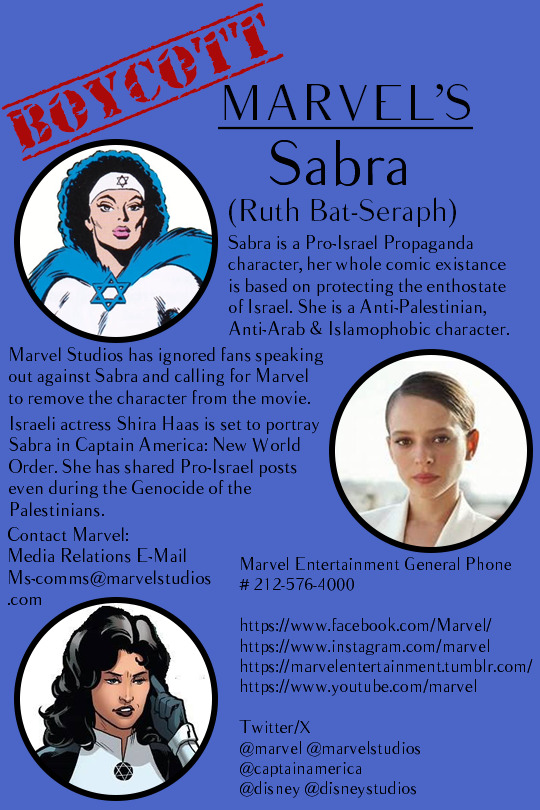
BDS HAS CALLED FOR A TARGETED BOYCOTT OF PRO-ISRAEL PROPAGANDA CHARACTER SABRA!!!
BOYCOTT SABRA (RUTH BAT-SERAPH) IN MARVEL'S CAPTAIN AMERICA : NEW WORLD ORDER!!!
As Captain America: New World Order is released I urge all fans who are against Zionism to flood the Captain America tags with messages of Boycott Sabra. All the links provided in the graphic are publicly available from their websites, and social media.
Anti-Zionism =/= Anti-Semitism!!! We are boycotting Sabra not because she is Jewish but because she represents a Pro-Israel, Pro-Zionist message that should not be platformed in any media. Her comics have Pro-IDF propaganda.
Marvel was made aware of the fact that this character promotes a Pro-Israeli & Anti-Palestinian sentiment when the character of Sabra was announced for Captain America 4, despite fan concern, and calls for Marvel to remove this character from the movie and despite have more than enough time to respond to what type of statement this would promote, a Pro-Zionist, Pro-Israel stance and despite reshoots Marvel has still chosen to keep Sabra in the movie. Shira Haas is the actress playing Sabra, she is Israeli and has shared Pro-Israel posts online even during the genocide of the Palestinians.
Marvel claims they will be reinventing the character however a character whose very nationality and backstory relies on Pro-Israel & Pro-Zionist ideals is irredeemable especially because not once in all her comic appearances does she ever change her Anti-Palestinian stance. Israel is currently committing a Genocide against Palestinians. Since of October 7th more than 30,000 Palestinians, of which over 12,000 are children, have been murdered by Israel. Over 60,000 have been injured, more missing, and millions displaced in Israel's genocide and ethnic cleansing of the people of Palestine. This is in addition the 75 year long occupation, countless war crimes, and 16 year blockade on Palestinians.
Marvel claims to care about Jewish characters, but Marvel hasn't even cast Jewish actors for Jewish Characters like Moonknight. Marvel choosing to back a Pro-Israel, Pro-Zionist character like Sabra sends a very clear message that aligns with Marvel Comics long held Anti-Palestinian sentiment. There are other Jewish characters for Jewish representation, such as Magneto, and Kitty Pryde, who were not created with a Pro-Israel, Pro-Zionist background.
BOYCOTT SABRA!!! Send a message, write a tweet, make a post, and tag Marvel and Disney and let them know why you are Boycotting Captain America: New World Order. I love Sam Wilson as Captain America but I will never support a movie that has Sabra as a character.
For more information about the character's history here is a breakdown of her appearances in Marvel Comics.
The Incredible Hulk (1968) #256 - Sabra's Origin
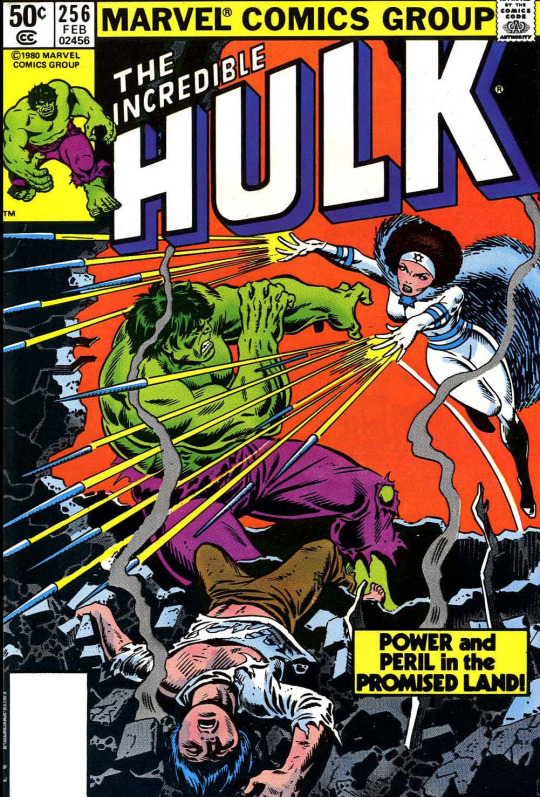
On the cover of Sabra's origin issue is the image of a dead Palestinian boy.
continued...
As we read the issue, we find Bruce Banner/The Hulk has stowed away on the ship "The Star of David" to Palestine, in the comics it is called Israel, however Marvel Comics has long been erasing Palestine, calling it only Israel.
This is Marvel Atlas (2008) #2 page on Israel
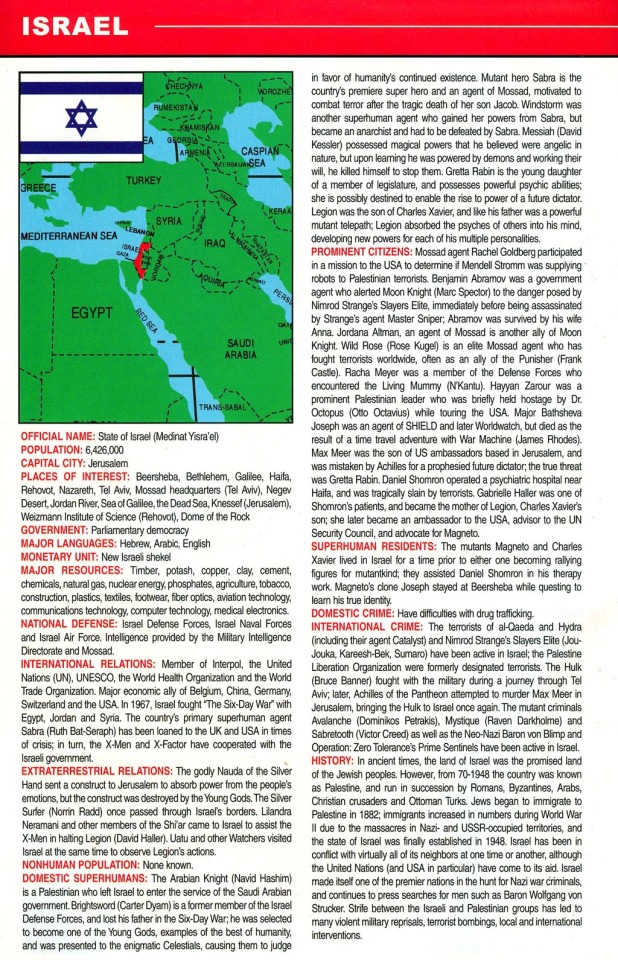
Marvel Fandom Wiki states that Palestine was the name of the land before Israel. While I understand that Marvel's 616 Universe is fictional, it's important to state that they base their locations on Real Life locations, and in 1948 Palestine underwent The Nakba, in which Israeli Forces displaced over 750,000 Native Palestinians and killed countless men, women, and children, stole land and homes, and forced the remaining Palestinians into the Gaza Strip which is the world's largest concentration camp, or confined to the West Bank all of which is under Apartheid laws today, or out of Palestine with no right to return to their homes and lands.

That being said, Sabra was created in 1980, as a Mossad Agent, Mossad is the Israeli Secret Service which has done so much harm to Palestinians. In her first issue she was working as a cop in Tel Aviv.
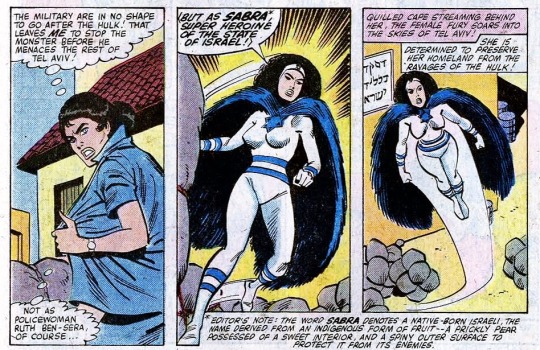
The Editor's note states: "The word Sabra denotes a Native-Born Israeli, the name derived from an indigenous form of fruit - a prickly pear possessed of a sweet interior, and a spiny outer surface to protect it from it's enemies."
Sabr (arabic, it also means "patience") is a cactus prickly pear that is Native to and found growing in Palestine. Read more about it in this article talking about the politics of Palestinian erasure and the Sabr fruit.
The Prickly Symbolism of Cactus Fruit in Israel and Palestine.
“If you look at most Palestinian villages demolished in Israel, what’s left is cactus fruit and olive trees,” says Qattan. Since 1948, he adds, this has imbued the cactus plant with a “mythical symbolism.”
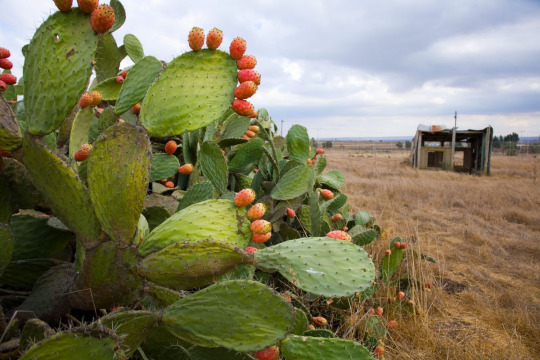
When Blum’s father started the farm, he knew that many parts of the world have cactus fruit plants, so he wanted to make theirs the best. They chose Dimona, in southern Israel, because of its intense sun and “the Zionist dream of making the desert bloom.”
"Making the desert bloom" is a racist Zionist ideals and propaganda that has caused severe ecological damage to Palestine by destroying thousand years old Olive trees to plant non indigenous trees that are not native to Palestine in a form of ecocide. So even the character Sabra, her very name brings a connection back to the Nakba, the ethnic cleansing of Palestinians & promoting Zionism.
However Sabra's name also has another very real and very tragic memory. One I will discuss here before returning to the comics. Just two years after her appearance in comics in 1980, Israel's war crimes continue.
The Sabra & Shatila Massacre 1982
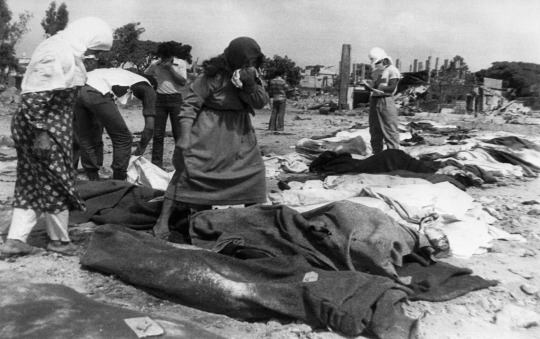
The article linked above has information of what occurred September 16-18, 1982. There were the Refugee camps of Sabra & Shatila, where Palestinians displaced from Israeli Occupation lived, and they, as well as Lebanon Civilians, were killed by the right wing Lebanese Militia working with the Israeli Military, which took the lives of 2,000 - 3,500 people in 2 days. Raped, tortured, murdered. Many Palestinians know the history of the massacre and bringing up the names of Sabra & Shatila is a constant reminder of the deaths that occurred, the war crime that was committed, and that 42 years later not one person involved in the massacre was held accountable.
The Sabra and Shatila massacre is remembered as one of the most traumatic events in Palestinian history and its memory is commemorated annually by Palestinians in Lebanon and in Palestine.
Marvel promoting a character like Sabra who's very creation ties into the Pro-Zionist Israel a statement that Marvel is promoting a Pro-Israel message. No matter what changes occur to the character in the movie, already her very creation, her very name is linked to the deaths and torture of thousands of Palestinians. It does not matter that she was created 2 years before the Sabra & Shatila massacre, her name is still connected to the ethnic cleansing of Palestinians from the 1948 Nakba and the creation of Israel.
For anyone who says "Well Marvel couldn't change her name just because of Political Controversy" let me remind you that when the American Black Panther Party gained popularity Marvel changed The Black Panther's name temporarily to the Black Leopard because they didn't want to associate the character with the American Black Panther Party.
Now that you have an understanding of why Palestinians are rightfully boycotting an Israeli Propaganda character let me return to the the comics.
Back to The Incredible Hulk (1968) #256; this comic is one of the most Anti-Palestinian, "Arab Terrorist Propaganda" comics I have ever read so I will briefly outline the plot: The Hulk meets a poor Palestinian boy who was stealing a watermelon (The watermelon is the symbol of resistance for Palestinians) and Bruce spends time with the boy, Sahad, however Sahad is killed by a bomb. Hulk is enraged and fights the Arabs, Sabra intervenes and thinks Hulk is in league with the Arabs and attacks him.
Hulk takes Sahad's body away and Sabra thinking Hulk was fighting with the Arab Terrorists goes after him in order to protect Israel. However she finds that Hulk wasn't the monster she thought he was. Hulk's angry speech about the Israel-Palestine conflict leaves Sabra shaken and for the very first time she sees a Dead Palestinian Arab Child as human.
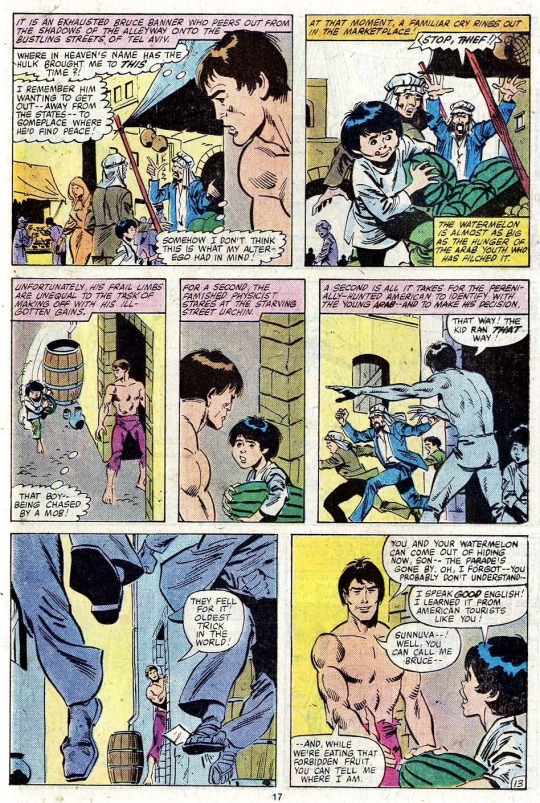
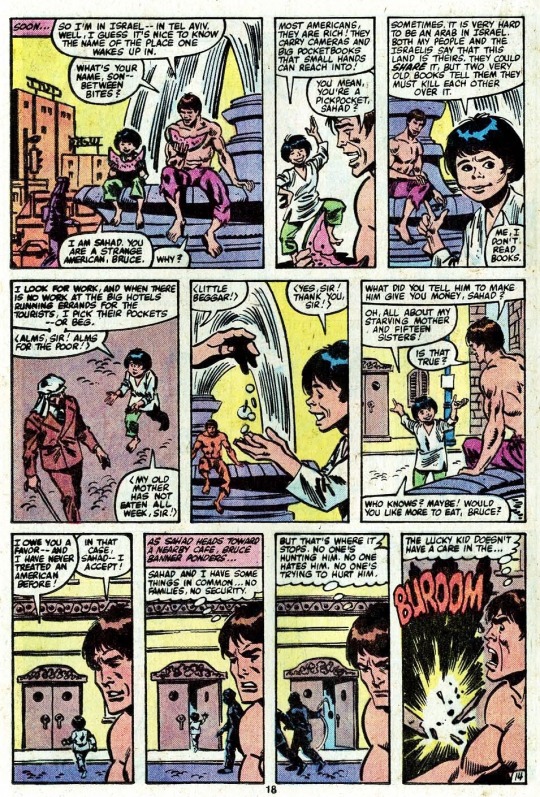
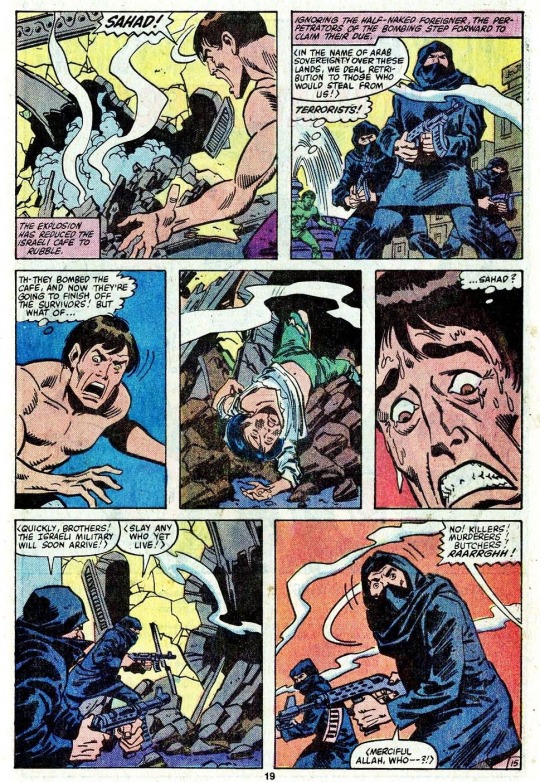
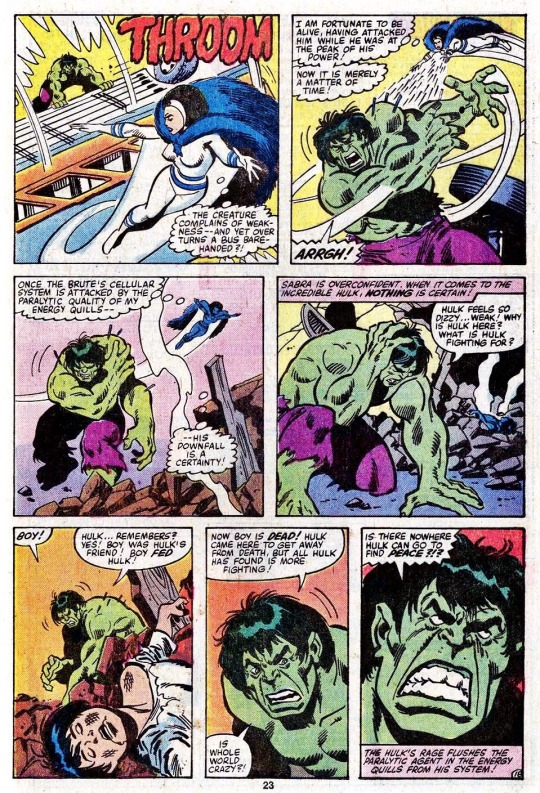
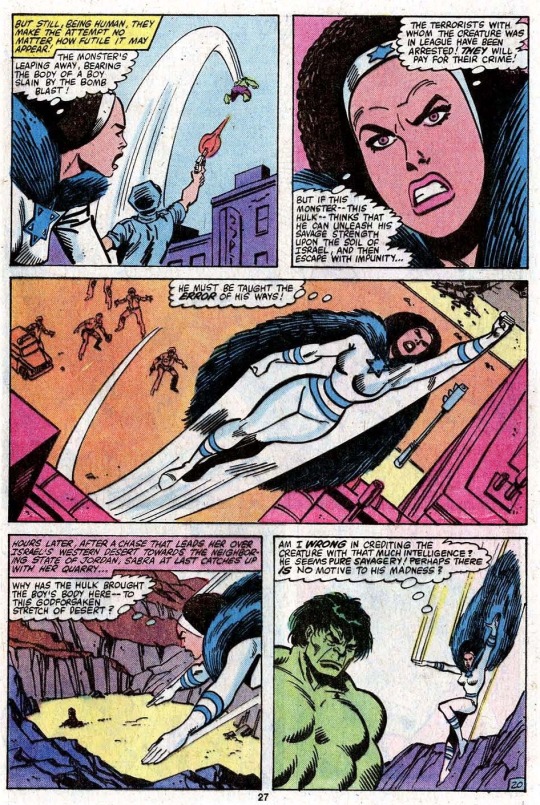
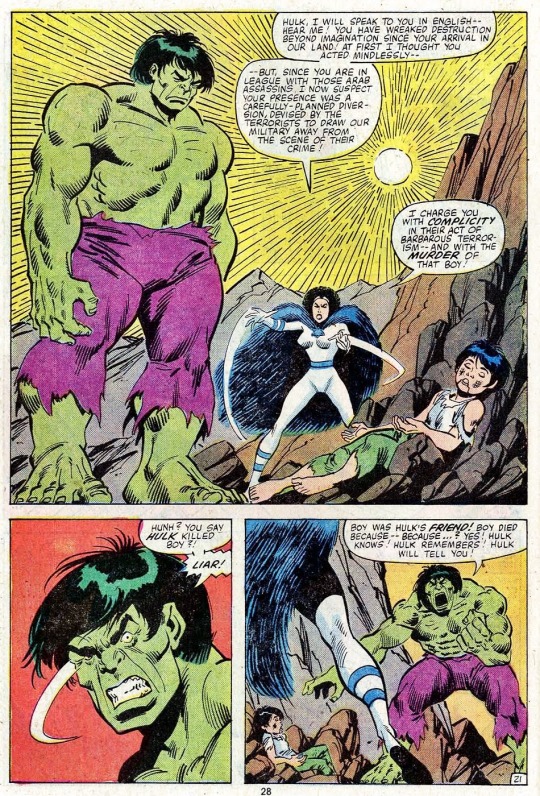
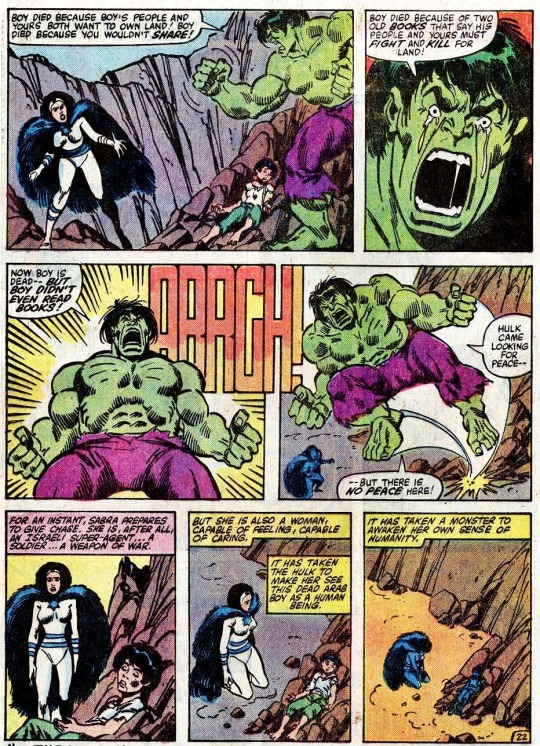
"For an instant, Sabra prepares to give chase. She is, after all, an Israeli Super-Agent... A Soldier... A Weapon of War.
But she is also a woman, capable of feeling, capable of caring. It has taken The Hulk to make her see this Dead Arab Boy as a Human Being. It has taken a monster to awaken her own sense of humanity.
Reminder this is her FIRST FULL COMIC, this is her ORIGIN, and you would think that perhaps she is more sympathetic to the plight of the Palestinians after this but she isn't. Let's continue with the rest of her comic appearances.
Marvel Super Hero Contest of Champions (1982) #1-3
Sabra is included in the contest of champions where superheroes must team up to battle their foes, she is teamed up with Iron Man, and The Arabian Knight (1st incarnation: A Saudi Bedouin with mystic artifacts/powers). Again, the Anti-Arab racist stereotype of Arab men being misogynistic towards women (misogyny is not a trait of ONLY Arab men, it is something that occurs world wide, however focusing it only on Arab men is racist) as well as the Zionist Propaganda lies that Arabs hate Jews, Arabs vs Jews, Arabs and Jews are enemies because of their religion. Not to mention that this Arabian Knight (Abdul Qamar) is from Saudi Arabia, he has no ties to Israel, so Sabra is judging him because he is Arab and has conflict with him because of their countries, it ties into the stereotype that "All Arabs are the same", Saudi Arabia is not Palestine.
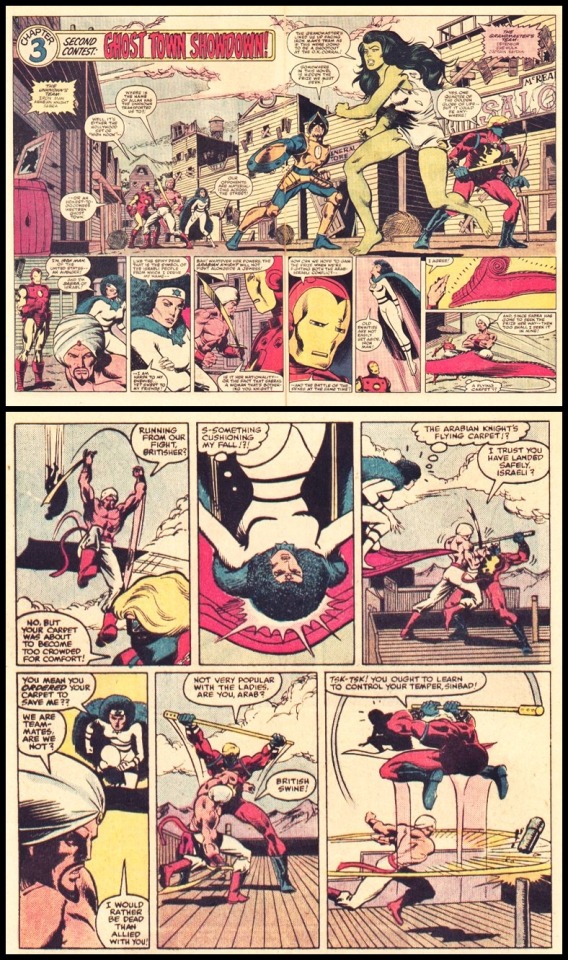
Even after The Arabian Knight saves Sabra, she states her hatred and racism towards Arabs; "I would rather be dead than allied with you!"
The Incredible Hulk (1968) #279 - Sabra once again states it was the Hulk who taught her about Humanity.
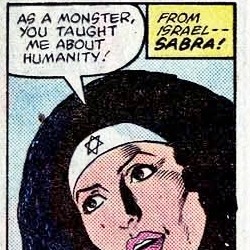
Marvel Super-Heroes (1990) #6 - Sabra fights Israeli Anarchists who want to overthrow the Israeli Government and saves the American Ambassador's son, who is deaf. The main villain is a woman who Sabra saved by giving her some of her life energy, and she is upset because she did not want to be saved nor does she want to fight for Israel with the powers Sabra gave her. Sabra takes her life energy back and it kills her.
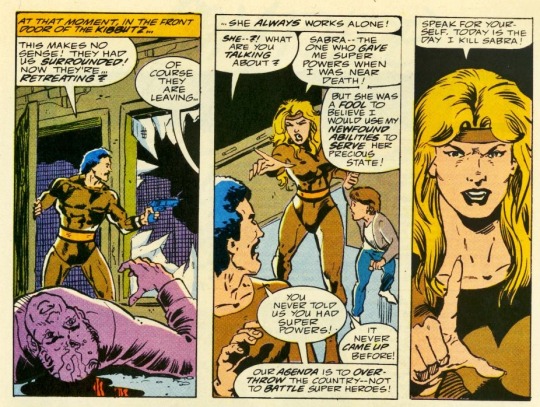
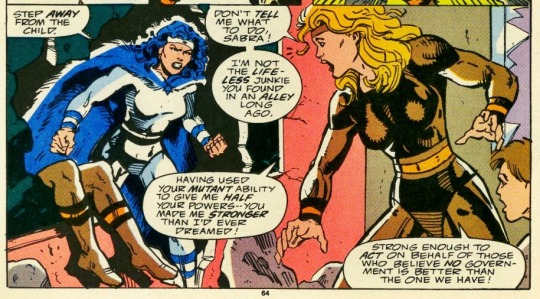
A constant running theme throughout her comics is that one of Sabra's repeated goals is the protection of Israel even above her own life.
The Incredible Hulk (1968) #386-387 - Sabra thinks the Hulk is in league with people who are trying to kill a boy, and attacks him. Later she thinks Hulk has defeated her and has this speech where she says that Israeli Soldiers are beating their wives out of frustration.
Again, how is that not the fault of the soldiers, why is it even when they are perpetrators of violence it's not their fault because they are frustrated?!

The main plot was that a Jewish man, who survived the German Nazi concentration camps, believed the boy to be the next Hitler which is why he wanted to stop him.
I never downplay the horror of the Holocaust or what Jewish people suffered from Nazis, from Anti-Semitism, throughout their history, but I am mainly focusing on how Sabra's character is in the comics and how that related to Anti-Palestinian, Anti-Arab sentiment.
The New Warriors (1990) #58-59 - Sabra reveals that her six year old son was killed by Arabs, bombed on a school bus, after she urges the New Warriors to kill Batal, a Syrian Super-Agent. Batal then states that it was the PLO (Palestinian Liberation Organization) that killed her son and to stop generalizing all Arabs.
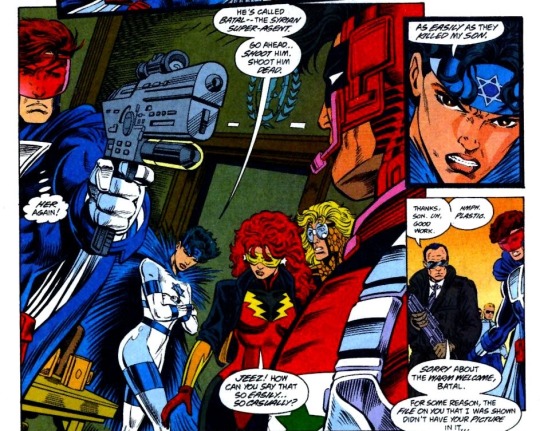
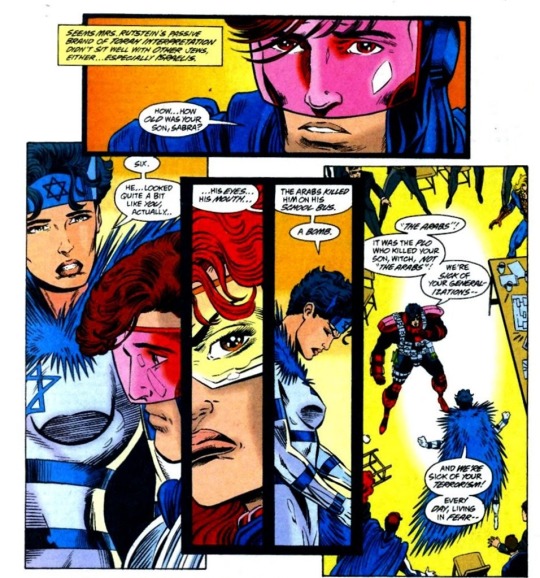
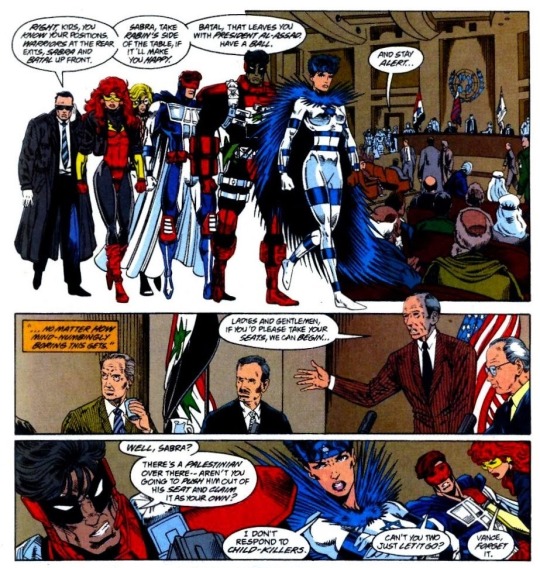
Batal: Well Sabra? There's a Palestinian over there -- aren't you going to push him out of his seat and claim it as your own?
Sabra: I don't respond to child-killers
Again, Sabra's racism against Arabs doesn't end at Palestinian Arabs, but extended to Saudi Arabia and now Syrian Arabs. LET ME BE VERY CLEAR THAT SABRA IS BEING RACIST: Batal has 2, TWO, only 2 comic appearances, he is there as security detail like Sabra is, there is nothing about his character that indicates he's anything but a Syrian Superhero, and Sabra still called him a child killer because she thinks all Arabs are child killers. Batal is written with the stereotypical racist Arab Man writing that many Arab characters suffer from, and he does insult Sabra by calling her an "Israeli Pig" after she treated Batal with disrespect, distrust, and suspicion ever since his arrival.
Sabra is then mind controlled into stopping the peace conference and killing everyone who allowed it to happen. She is stopped by the New Warriors.
Sabra's son is never once shown in a flashback, we are only ever told of him and how he died.
X-Men (1991) #67-69, 72-73
Sabra's dead son's name is revealed to be Jacob, she uses her position in Mossad to get secret information for the X-Men.
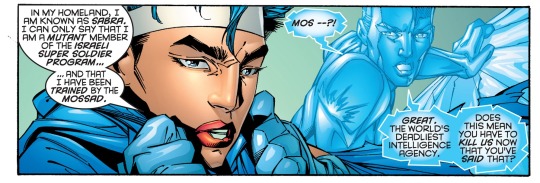
She later has plans to track down and kill Magneto, but ends up fighting with his clone, Joseph, before being told that wasn't the real Magneto and stopping.
Excalibur (1988) #120-121
Sabra teams up with Excalibur to defend "Israel" from Legion's ghosts. Then she is debriefed of her mission by Mossad.
Uncanny X-Men (1963) #366, 367, 379
Sabra takes Joseph (Magneto's clone) to an Israeli Military bunker where scientists study his DNA and state he is a clone of Magneto. Later Sabra attends Joseph's funeral.
X-Men (1991) #111
Sabra makes a statement about Magneto; Israeli Super-Agent Sabra weighed in on the looming war with her usual candor, "It is clear to me at least that Magneto has become the monster he claims to despise. There are some factions who believe this rumored son of Israel has brought much shame to his countrymen. Factions who believe he should be dealt with once and for all. Okay maybe not factions. But certainly Individuals... like me."
New X-Men (2001) #131-132
Sabra attends a funeral for Darkstar in #131. In #132 Sabra interacts with the mutants, and x-men, and says to Quicksilver (on the apparent death of Magneto), "I'm sorry Quicksilver, but good riddance. Magneto was a master-race lunatic who coherenced the entire Genoshan mutant population into a war with humanity and brought this on himself."
JLA/Avengers (2003) #4
Single panel appearance where Sabra is shown protecting the Wailing Wall in Jerusalem. Again she is called an Israeli hero.
Side Note: I don't think there's been a single comic where Sabra has a major presence that has not mentioned at least once that Sabra is an Israeli Super Hero, a Mossad Agent, or an Israeli Super-Agent at least once. It's so noticeable that they always mention it and how big of a role it plays in her character.
Excalibur (2004) #5
Flashback two panel appearance of Sabra on Genosha.
Civil War: X-Men (2006) #1-4
Sabra fights on the side of Tony Stark/Iron Man and battles Archangel, then aids an injured Micro Max.
Civil War (2006) #6
Sabra fights on the side of Tony Stark/Iron Man.
Union Jack (2006) #1-4
The Arabian Knight has changed mantles, the 2nd incarnation is portrayed by a Palestinian Hero, Navid Hashim. I make mention of this because in Union Jack (2006) #1 Navid is called a Saudi, then in Hulk (2008) #45 Navid is called a Afghani, however the Marvel Fandom Wiki stated he was a Palestinian and I wanted to confirm it, which I did in:
Marvel Encyclopedia, New Edition (2019)
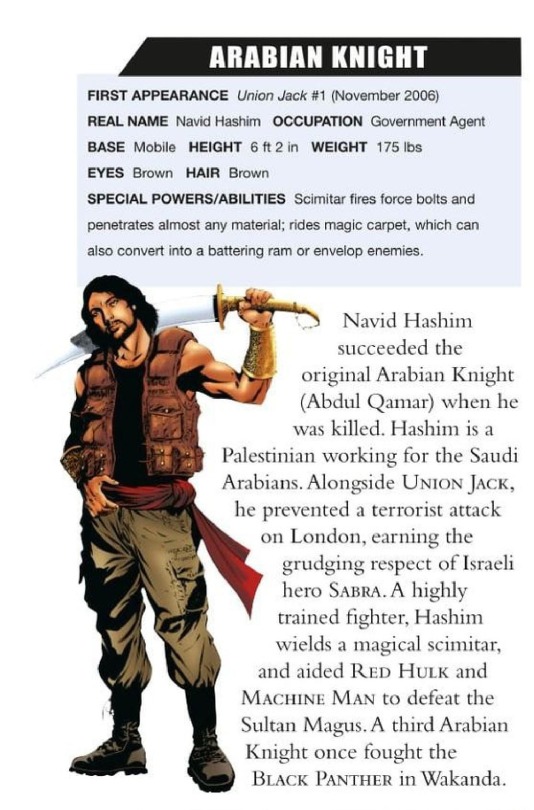
In the first issue of Union Jack, right off the bat, Sabra has an issue with The Arabian Knight, and is antagonistic towards him.
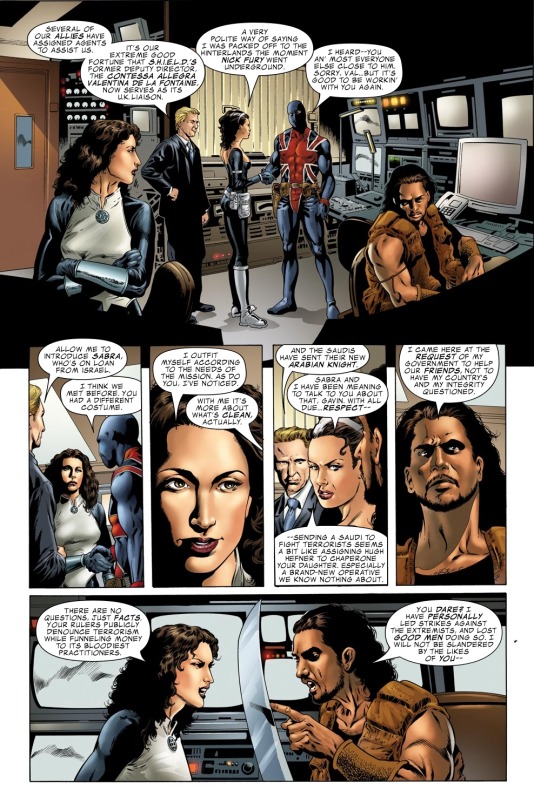
Navid is written in Marvel's usual racist writing; the misogynistic Arab man stereotype. Navid tells Sabra she should embrace her role as a mother instead of a hero. Sabra snaps and chokes him while telling Navid that Palestinians killed her son. Note how now it's Palestinians and not, Arabs, and not the PLO? Because by now the PLO is no longer considered a Terrorist group, so Marvel can't blame them and instead shift the blame to all Palestinians for the loss of Sabra's son. Arabs is too general, so of course it's the Palestinians.
To this date Sabra's son, Jacob, has still never appeared in any flashbacks, never seen drawn into a comic with Sabra, no mention of who the boy's father is. Nothing except Sabra's loss and hatred of the Palestinians. Even in her first solo comic series, which I discuss further down, does not mention her son. Using the death of an Israeli child to justify villainizing the entire group of Palestinian people is Zionist Israelis do. It's Anti-Palestinian Propaganda.
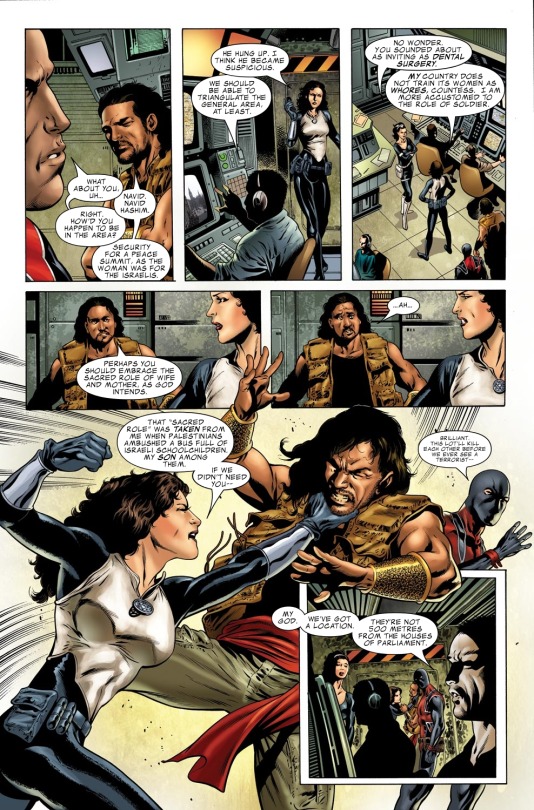
Later Navid gets hurt and Sabra checks on him, he tries to apologize;
Arabian Knight: About your son... I only meant.
Sabra: Don't. We are allies of the moment. Another day I would have driven the dagger home.
Later Sabra, The Arabian Knight, and others are mind controlled by the villain to attack Union Jack. Union Jack is told that he can distract them by turning them against their "natural enemies" and then Union Jack insults Sabra and uses Sabra's hatred and racism towards Arabs to turn her against The Arabian Knight. Sabra calls Navid a terrorist as she attacks him.
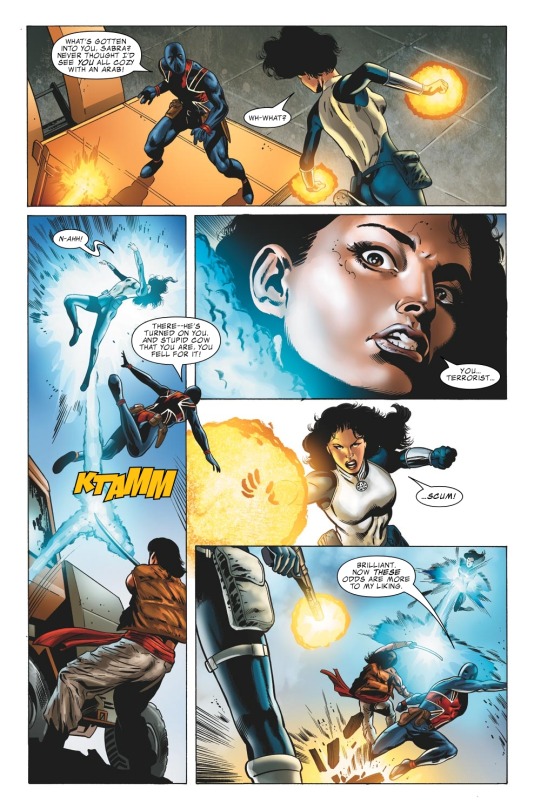
The mind control gets broken, and the team rallies to save the day by the last issue. The final exchange between The Arabian Knight and Sabra shows a tense acknowledgement between them meant to show begrudging respect. This is the nicest Sabra has been to any Arab character since her creation. The bar of "showing respect" is literally on the ground.
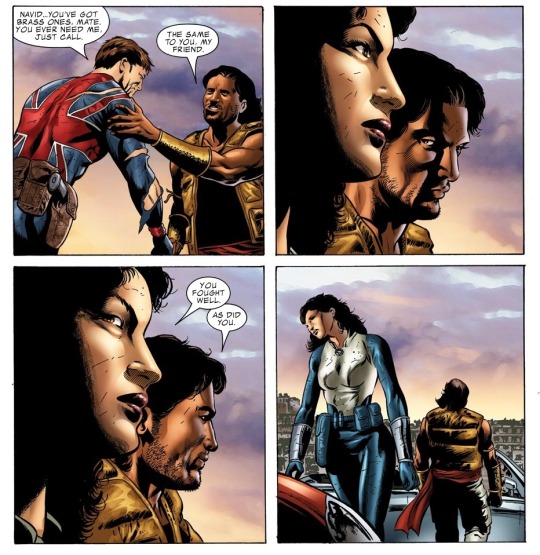
Secret Invasion #6
Cameo one panel appearance of Sabra in Israel fighting a Skrull.
Astonishing Tales (2009) #6 - Astonishing Tales: Sabra
Tagline in the comic states:
Sabra: Whether as an agent of Mossad, or a superhero, the Israeli mutant Ruth Bat-Seraph has never doubted her decision to put her country above self. Fighting alongside the Avengers, X-Men, and Captain Britain, as the patriotically garbed Sabra. Ruth has proven herself a champion to all nations.
"Sabra in Flight" - is one of the most disgusting pieces of Israeli comic propaganda I have ever read thus far in Sabra's comics. For my first time reading it I was shocked at how easily they projected the narrative of Israel as something noble and worth dying for. This piece of utter trash is the very first time Sabra has her own solo comic story. Let that sink in. This is the first time in 29 years since Sabra's creation 1980 that she has her own solo comic story. Sabra's total presence in the comics is 42 years.
The only things we know of her character is that her name is Ruth Bat-Seraph, she was born and raised in a special Israeli Kibbutz (Israeli settlement), that she manifested mutant powers that include; flight, energy quills, poisoned quills, super strength, and life energy transference. Sabra had a six year old son named Jacob who died in a bombing. She has always stated or maintained her solidarity and defense of Israel even above her own life. She is racist to any Arab, especially Palestinian Arabs.
It also important to note her costume changes over the years, her Star of David has diminished greatly from being on different parts of her uniform to just barely being a necklace/neck accessory. Her roles as Israeli Hero is greater than that of her being a Jewish Hero.
This comic introduces us to Ruth at a Israeli social function in Jerusalem, where is with her mother. Her mother tells her not to spill anything on her Sabra uniform, and mentions how people want to talk to her, Their Greatest Soldier. Again the emphasis on her being an Israeli Soldier and a Mossad Agent is hammered home in the first page of this comic.
Mother: "Your dad would be so proud of you, Ruth. To see his daughter in uniform protecting the Nation."
Ruth: "I just hate being put on display at these receptions. I am a Mossad Agent after all."
Then the next bit of news we learn is that Sabra has a brother. So now we know she has a mother and brother who is living, and her father is deceased. Next a old friend of Ruth's arrives with her teenage daughter, Yael, in tow, she introduces Sabra to her daughter and leaves them to talk. Sabra then mentions to Yael that she must be getting close to her mandatory military service soon. Yael mentions she is nervous because her friend was in the military and was paralyzed in Gaza.
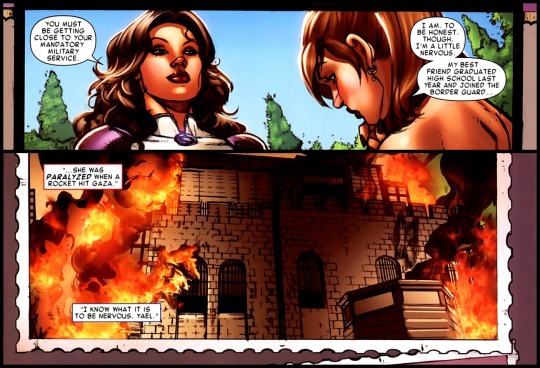
Sabra then spends the next part of the comic reassuring Yael that it's ok to be nervous and that she was nervous too sometimes and mentions a story where she faced Hydra, and that when Yael goes into the Israeli military (IDF: Israeli Defense Force) she will learn a lot.
Sabra: "You'll learn a lot when you enter the Military. But the biggest thing you'll discover is that you have two families; your military family, and your personal family. Both will always be there for you, and perhaps even sacrifice themselves for you. A hard truth I learned the day my dad died rescuing me."
Yael mentions how her father was killed by surface to air missiles, and then goes on to say she was accepted into the air force flight academy and she always wanted to fly but that she was nervous. She mentions she might go into Military Intelligence. Sabra says that is good too but Yael then says she feels she was always meant to fly. So to convince Yael go into air force and alleviate her fears Sabra then takes her in her arms to fly her over Jerusalem and tells her that this land is what their dads died for. And she is convinced that Yael will make the right choice.
Side Note: Excuse me while I throw up, this entire comic made me feel so disgusted. I always try to write and speak about comics as professionally as I can but fuck this comic. Fuck this Pro Israel Propaganda. Fuck Sabra. Fuck this Pro-IDF comic. Fuck making an entire comic about reassuring a young teenage Israeli girl to go and join the IDF to fight in Gaza, to kill Palestinians. THIS. This is why Sabra will NEVER be able to be divorced from her origins, her character, as a Pro-Israeli Super Agent. No matter what Marvel tries to put into the movie this is who the character is at her very core.
Over 12,000 children have DIED since October 7th. Israel is committing genocide against the Palestinian people, but Marvel and the MCU, and Disney think it's ok to have a Israeli Superhero in a Captain America movie? Boycott. Scream out online to them. Tell them we do not want their Israeli Propaganda. Sabra should never ever be used for any platform, movies, shows, animation, comics, ever again. Over 30,000 Palestinians have been slaughtered by Israel in the last few months alone. Never forget.
I'm shaking with rage as I write about this comic but we move on. There's still some comics left to discuss. However in my firm opinion this character is indefensible, she literally is an Israeli Propaganda character. She is propaganda for the IDF.
History of the Marvel Universe (2012)
Cameo Appearance.
Amazing Spider-Man (1963) #685, Amazing Spider-Man: Ends of the Earth (2012) #1
Sabra teams up with Spider-Man and other heroes, she is introduced as a Israeli based mutant, she fights spider robots in Jerusalem.
X-Men (2010) #31, 34-37
In Paris, Sabra greets Storm and later she helps the X-Men using her influence as a Mossad Agent.
X-Men (2013) #9, 11, 16 + X-Men Legacy (2012) #23
Sabra aids the X-Men.
Captain America: Steve Rogers (2016) #18
One page Cameo, Sabra appears to have completed a mission and gathered files.
Avengers (2018) #11
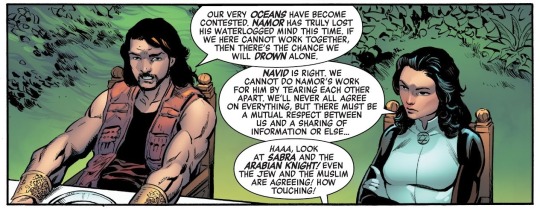
Sabra and the Arabian Knight are at a meeting called by The Black Panther. T'Challa wants everyone to work together, they are currently discussing an issue with Namor the Sub-Mariner, King of Atlantis. Ursa Major makes fun of the situation; "Haaaa, look at Sabra and the Arabian Knight! Even the Jew and the Muslim are agreeing! How touching!
Zionist propaganda of making it seem as if the conflict between Israel and Palestine is a religious conflict between an Arab and a Jew. Making of a Jewish and Muslim character getting alone because they should be fighting is racist, Islamophobic, and anti-sematic. The conflict between Israel and Palestine is NOT a religious conflict, Israel has been occupying and murdering Palestinians for 75 years. It is a conflict between Israel being a colonizer and Palestine being colonized. Israel is committing a genocide as I create this post.
At the end of all her appearances spanning 42 years Sabra has not once changed from her palestinian, arab hating, israeli zionist roots. All we get is her trading a few words back and forth with Arabian Knight and acting like an adult at a table full of kids. There isn't even respect between them. That is all the appearances of Sabra.
Why is important to boycott Sabra? In addition to the character being Pro-Israel, Pro-IDF Propaganda, giving a large platform like the one an MCU movie provides will give the actress a larger platform.
Israeli Actress, Gal Gadot, who is Pro-Israel, Pro-Zionism, Pro-IDF, and was a former IDF soldier, was cast in a high profile role of Wonder Woman, she used her platform, power, and access to thousands of fans to further messages of Zionism and even promoted a Pro-Israel propaganda film to be aired in Hollywood. The film was used to further the Zionist agenda of continuing their genocide against the Palestinians in Gaza. Bearing Witness (2023) is a Israel IDF propaganda film that Gal Gadot endorsed as Israel continued their genocide of the Palestinians in the Gaza Strip.
Wonder Woman isn't even Israeli, however the actress used her ties to the character to promote Israel. In Wonder Woman: 1984 there is a very racist, Anti-Arab, Anti-Palestinian message including a scene where Wonder Woman, played by Gadot, saves 4 Arab boys from a missile. Article Link
Why is that scene so controversial? Because Israel murdered four young boys who were playing on a beach in Gaza back in 2014 by a drone missile strike. Article Link
Gal Gadot and now Shira Haas having roles in movies with as much exposure as DC and Marvel movies promotes Israel, and Zionism. Pro Zionist groups have already voiced their approval of Shira Haas playing Sabra.
I will boycott any piece of media that features Sabra, the Israeli Propaganda Super Agent.
Use the Captain America tags to Boycott Sabra.
If you have read this far then please support Palestine. Support Palestinians and fight against Zionism. Comics were created by Jewish Creators, do not let Zionists try to erase their contribution or use comics to promote Zionism. Comics are never created in a vacuum, they are the pulse of current pop culture, of current news. Comics are Political and always have been. Marvel choosing to keep Sabra in the MCU sends a clear message of support for Zionism & Israel.
Find a Protest near you
Donate or Join Palestine Action
Donate to Palestine , HelpGaza , Palestine Donations , Aid Palestine
Learn about Palestine
#sabra#ruth bat-seraph#captain america 4#captain america#captain america new world order#boycott#zionism#israel#palestine#boycottsabra
5K notes
·
View notes
Note
how do i start to read marxist leninist/leftist stuff ? i searched on the internet but it’s super confusing lol
the most important value for me as an ML is anti-imperialism, so i guess i'll always recommend that people start with works centred on that
some suggestions below (all books should be available either on marxist.org or as pdf/epub files on libgen)
American Holocaust by David E. Stannard
about the colonization of america. not explicitly marxist, but it's probably done more to radicalize me than any other piece of writing. this is the pile of corpses capitalism is built on:
Within no more than a handful of generations following their first en counters with Europeans, the vast majority of the Western Hemisphere's native peoples had been exterminated. The pace and magnitude of their obliteration varied from place to place and from time to time, but for years now historical demographers have been uncovering, in region upon region, post-Columbian depopulation rates of between 90 and 98 percent with such regularity that an overall decline of 95 percent has become a working rule of thumb. What this means is that, on average, for every twenty natives alive at the moment of European contact-when the lands of the Americas teemed with numerous tens of millions of people-only one stood in their place when the bloodbath was over.
To put this in a contemporary context, the ratio of native survivorship in the Americas following European contact was less than half of what the human survivorship ratio would be in the United States today if every single white person and every single black person died. The destruction of the Indians of the Americas was, far and away, the most massive act of genocide in the history of the world. That is why, as one historian aptly has said, far from the heroic and romantic heraldry that customarily is used to symbolize the European settlement of the Americas, the emblem most congruent with reality would be a pyramid of skulls.
- David E. Stannard
2. Imperialism: The Highest Stage of Capitalism by Vladimir Lenin
Imperialism is capitalism at that stage of development at which the dominance of monopolies and finance capital is established; in which the export of capital has acquired pronounced importance; in which the division of the world among the international trusts has begun, in which the division of all territories of the globe among the biggest capitalist powers has been completed.
- Vladimir Lenin
3. The Wretched of The Earth by Franz Fanon
Let us look at ourselves, if we can bear to, and see what is becoming of us. First, we must face that unexpected revelation, the strip-tease of our humanism. There you can see it, quite naked, and it’s not a pretty sight. It was nothing but an ideology of lies, a perfect justification for pillage; its honeyed words, its affectation of sensibility were only alibis for our aggressions. A fine sight they are too, the believers in non-violence, saying that they are neither executioners nor victims. Very well then; if you’re not victims when the government which you’ve voted for, when the army in which your younger brothers are serving without hesitation or remorse have undertaken race murder, you are, without a shadow of doubt, executioners. And if you chose to be victims and to risk being put in prison for a day or two, you are simply choosing to pull your irons out of the fire. But you will not be able to pull them out; they’ll have to stay there till the end. Try to understand this at any rate: if violence began this very evening and if exploitation and oppression had never existed on the earth, perhaps the slogans of non-violence might end the quarrel. But if the whole regime, even your non-violent ideas, are conditioned by a thousand-year-old oppression, your passivity serves only to place you in the ranks of the oppressors.
- prefrace by Jean-Paul Sartre
4. Discourse on Colonialism by Aimé Césaire
Yes, it would be worthwhile to study clinically, in detail, the steps taken by Hitler and Hitlerism and to reveal to the very distinguished, very humanistic, very Christian bourgeois of the twentieth century that without his being aware of it, he has a Hitler inside him, that Hitler inhabits him, that Hitler is his demon, that if he rails against him, he is being inconsistent and that, at bottom, what he cannot forgive Hitler for is not crime in itself, the crime against man, it is not the humiliation of man as such, it is the crime against the white man, the humiliation of the white man, and the fact that he applied to Europe colonialist procedures which until then had been reserved exclusively for the Arabs of Algeria, the coolies of India, and the blacks of Africa
I have talked a good deal about Hitler. Because he deserves it: he makes it possible to see things on a large scale and to grasp the fact that capitalist society, at its present stage, is incapable of establishing a concept of the rights of all men, just as it has proved incapable of establishing a system of individual ethics. Whether one likes it or not, at the end of the blind alley that is Europe, I mean the Europe of Adenauer, Schuman, Bidault, and a few others, there is Hitler. At the end of capitalism, which is eager to outlive its day, there is Hitler. At the end of formal humanism and philosophicrenunciation, there is Hitler
- Aimé Césaire
5. Blackshirts and Reds: Rational Fascism and the Overthrow of Communism by Michael Parenti
probably the most accessible introduction to communism that doesn't demonize countries that have undergone—or attempted to undergo—a transitation into socalism (like the ussr, cuba, etc.)
The very concept of "revolutionary violence" is somewhat falsely cast, since most of the violence comes from those who attempt to prevent reform, not from those struggling for reform. By focusing on the violent rebellions of the downtrodden, we overlook the much greater repressive force and violence utilized by the ruling oligarchs to maintain the status quo, including armed attacks against peaceful demonstrations, mass arrests, torture, destruction of opposition organizations, suppression of dissident publications, death squad assassinations, the extermination of whole villages, and the like.
- Michael Parenti
#i'm too lazy to write an introduction for all of them#but i've included some quotes#get reading sickos#this is now on the tumblr university curriculum
7K notes
·
View notes
Text
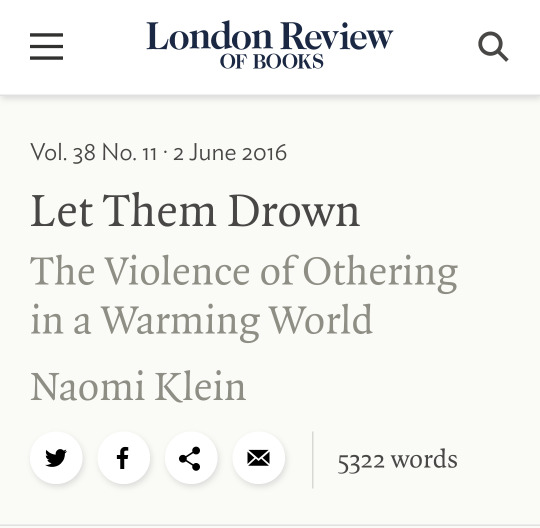
There are other reasons why environmentalism might have looked like a bourgeois playground to Said. The Israeli state has long coated its nation-building project in a green veneer – it was a key part of the Zionist ‘back to the land’ pioneer ethos. And in this context trees, specifically, have been among the most potent weapons of land grabbing and occupation. It’s not only the countless olive and pistachio trees that have been uprooted to make way for settlements and Israeli-only roads. It’s also the sprawling pine and eucalyptus forests that have been planted over those orchards, as well as over Palestinian villages, most notoriously by the Jewish National Fund, which, under its slogan ‘Turning the Desert Green’, boasts of having planted 250 million trees in Israel since 1901, many of them non-native to the region. In publicity materials, the JNF bills itself as just another green NGO, concerned with forest and water management, parks and recreation. It also happens to be the largest private landowner in the state of Israel, and despite a number of complicated legal challenges, it still refuses to lease or sell land to non-Jews.
...
The JNF is an extreme and recent example of what some call ‘green colonialism’. But the phenomenon is hardly new, nor is it unique to Israel. There is a long and painful history in the Americas of beautiful pieces of wilderness being turned into conservation parks – and then that designation being used to prevent Indigenous people from accessing their ancestral territories to hunt and fish, or simply to live. It has happened again and again. A contemporary version of this phenomenon is the carbon offset. Indigenous people from Brazil to Uganda are finding that some of the most aggressive land grabbing is being done by conservation organisations. A forest is suddenly rebranded a carbon offset and is put off-limits to its traditional inhabitants. As a result, the carbon offset market has created a whole new class of ‘green’ human rights abuses, with farmers and Indigenous people being physically attacked by park rangers or private security when they try to access these lands. Said’s comment about tree-huggers should be seen in this context.
...
But this only scratches the surface of what we can learn from reading Said in a warming world. He was, of course, a giant in the study of ‘othering’ – what is described in Orientalism as ‘disregarding, essentialising, denuding the humanity of another culture, people or geographical region’. And once the other has been firmly established, the ground is softened for any transgression: violent expulsion, land theft, occupation, invasion. Because the whole point of othering is that the other doesn’t have the same rights, the same humanity, as those making the distinction. What does this have to do with climate change? Perhaps everything.
We have dangerously warmed our world already, and our governments still refuse to take the actions necessary to halt the trend. There was a time when many had the right to claim ignorance. But for the past three decades, since the Intergovernmental Panel on Climate Change was created and climate negotiations began, this refusal to lower emissions has been accompanied with full awareness of the dangers. And this kind of recklessness would have been functionally impossible without institutional racism, even if only latent. It would have been impossible without Orientalism, without all the potent tools on offer that allow the powerful to discount the lives of the less powerful. These tools – of ranking the relative value of humans – are what allow the writing off of entire nations and ancient cultures. And they are what allowed for the digging up of all that carbon to begin with.
2 June 2016
#naomi klein#edward said#climate change#palestine#israel#london review of books#environmentalism#conservation#jewish national fund#jnf
71 notes
·
View notes
Text
Ok y'all I have promised my beloved mutual @pop-squeak that I would write a post on my most beloved invasive marsh plant, Phragmites australis also known as the common reed. This thing is so invasive that it is considered a model for invasive plants as a whole.
Some things before we start
Most of this is focused on Virginia since that's where a lot of the research on this bad boy is being done but it does exist elsewhere
I will have citations at the end if you want some more reading
This is based on research I did for a paper like a year ago so there might be new research I am unaware of due to having other classes to do
Please brush off your shoes when you enter/ leave a park so you don't bring stuff places it shouldn't be
Please read I promise it is really really interesting and important to the resilience of out coasts in North America especially in the mid Atlantic to the south :)
If you have questions don't be scared to drop them in the replies/ reblogs
I am an undergrad!!!!! I am generally new at this but I am fairly familiar with this specific subject and trust that everything in this post is accurate, but in general with invasive species it is a heavily nuanced topic that can be very complex. This is my best attempt to simplify this species for general consumption since I think its just really cool and important to coastal botany rn.
This thing lives in the marsh which is the area often between forest and the ocean/ body of water of varying salinity. This thing loves moderate salinity marshes since it can somewhat resist salt water intrusion. This is a part of what makes it so invasive especially in this era of severe sea level rise. Many coastal forests are dying as sea level is rising pushing the marsh farther inland. Part of the problem is that many native species can not move as colonize the new land as fast as the common reed can.
Phragmites as is incredibly good at reproducing and growing so close together that nothing else can live even close to it. It makes clonal offshoots of itself (THEY CREATE CLONES OF THEMSELVES?!?!?!?!?) and creates networks for communication. this dense packing leads to a monoculture where for miles in the strip of marsh 95% of what you see is phragmites. It is a magnificent and horrifying sight as you see the dead trees in the middle of these fields of phragmites knowing it was only 5-10 years ago that that was where the forest line was. It is the beautiful horror about being slowly consumed by the ocean. This monoculture does not only apply to flora but also fauna.
Farmers often actually welcome phragmites to their land and are resistant to get rid of it. This is because as native species have died off, phragmites has been able to colonize these areas fast enough to help resist further salt inundation and prevent flooding. This unfortunately is only a band-aid solution, especially in southern Virginia near the Chesapeake bay which has some of the highest rate of sea level rise in the country, since native plants and diverse marshes make them more resistant to flooding. It is better than nothing though, so we must keep in mind transition plans for farmland when trying to manage phragmites. We practice science to help every day people, not in spite of every day people. They should be included in all management decision making. We work for them not the other way around.
Competition is the name of the game for Phragmites. It beats is competition not only with its cloning abilities (there's a lot more to this but i had to read like 7 different papers to figures out wtf anybody was talking about so I'm not going into it) and sheer density, but it can also just poison the other plants around it. It can release a toxin that inhibits growth and seed sprouting in other species. It is also resistant to flooding and drought and it has been found that ground disturbance can make it spread faster. This makes it highly resistant to most disturbances that occur in marsh and wetland habitats.
Because it is resistant to like everything it is so hard to kill. To the point where some of the people who management have told me that eradicating it for an area is near impossible and an unreasonable expectation. Reduction has become the best case scenario. This makes early identification important. You can try to kill it by herbicides, mowing, fire, smothering with a plastic tarp, throwing a bunch of salt on top of it, and flooding with fresh or salt water.
The common reed is an interesting mix of being both a native and invasive plant. Phragmites australis has a subspecies native to North America, but this subspecies has been largely replaced by a more aggressive non-native European subspecies. Phragmites can grow from three to thirteen feet with broad sheath like leaves. Its considered one of the most invasive plants in the worlds having a broad geographic range. It exists on every continent except Antarctica.
As someone who has been in a field of them you can not pull these out of the ground. The tops break off but you have to dig them out of the ground if you wan them out. Also just a pain to walk through.
Here's a pic: (Yes that a person, yes they can be that tall)
Works Cited
Langston, A. K., D. J. Coleman, N. W. Jung, J. L. Shawler, A. J. Smith, B. L. Williams, S. S. Wittyngham, R. M. Chambers, J. E. Perry, and M. L. Kirwan. 2022. The effect of marsh age on ecosystem function in a rapidly transgressing marsh. Ecosystems 25: 252-264.
Humpherys, A., A. L. Gorsky, D. M. Bilkovic, and R.M. Chambers. 2021. Changes in plant communities of low-salinity tidal marshes in response to sea-level rise. Ecosphere 12.
Accessed 9 December 2022. Invasive alien plant species of Virgina: common reed (Phragmites australis). Department of Conservation and Recreation, Virgina Native Plant Society.
https://www.dcr.virginia.gov/natural-heritage/document/fsphau.pdf
Accessed 9 December 2022. Common reed (Phragmites australis). Virgina Institute of Marine Science.
https://www.vims.edu/ccrm/outreach/teaching_marsh/native_plants/salt_marsh/phragmites_facts.pdf
Theuerkauf, S. J., B. J. Puckett, K. W. Theuerkauf, E. J. Theuerkauf, and D. B. Eggleston. 2017. Density-dependent role of an invasive marsh grass, Phragmites australis, on ecosystem service provision. PLoS ONE 12.
Accessed 9 December 2020. Phragmites: considerations for management in the critical area. Critical Area Commission for the Chesapeake Bay and the Atlantic Coastal Bays.
https://dnr.maryland.gov/criticalarea/Documents/Phragmites-Fact-Sheet-Final.pdf
Uddin, M. N., and R. W. Robinson. 2017. Allelopathy and resource competition: the effects of phragmites australis invasion in plant communities. Botanical Studies 58: 29.
Meyerson, L. A., J. T. Cronin, and P. Pysek. 2016. Phragmites australis as a model organism for studying plant invasions. Biological Invasions 18: 2421-2431.
#im having a lot of fun#This is another one of those things i had a very fun time making but will get 2 notes#and thats ok#this is what i want to get my phd in..... hopefully#ecology#biology#coastal biology#coastal botany#botany#phragmites australis#invasive species
15 notes
·
View notes
Text
Pirate-Son Bonding
on AO3
Category: one shot, fluff, Captain Cobra
Summary: While Emma enjoys a girl's night out, Killian and Henry have a boy's night of their own. Homework, movies and 'sword'fights included. Henry comes to an important realisation.
Word count: 1 695

Henry glanced into the living room where Killian was sitting, buried in a book ever since Emma left for her girl's night out with Mary Margaret, Mulan and Ruby and Dorothy, who were visiting from Oz.
Henry started working on his homework when Emma left and Hook gave him his space, but still remained in his proximity on the other end of the open space of their ground floor. Somehow it felt nice to have company even though they were each doing their own thing. But when Henry started to lose his focus as the homework dragged on, his gaze started darting distractedly around the room and he noticed that every once in a while, Killian lifted his eyes from the pages he was reading to glance in his direction as if he was waiting for him to finish.
Henry took one of his earbuds out and tapped his pencil on the table. He smiled to himself and cleared his throat.
"Um, Hook?"
"Aye, Henry?" came his rather prompt response.
"I'm almost done with the homework. I was wondering if you could help me with it, maybe?"
Hook was already out of his armchair and ready to stride over to him, doing a poor job at hiding his excitement at being asked to help. At being asked to help him specifically, Henry realized with a sudden warm feeling.
"So," the pirate said, sitting down beside him at the kitchen table, "what sort of task do we have to resolve?"
"It's Geography," Henry said, pointing to the atlas. Hook's eyes lit up at the sight of it until he realized he was unfamiliar with most of the map, since he was not native to this world.
"Well, I suppose it's past time I learn more about this world's land and seas. What exactly do we have to do?"
"I have to fill in answers to these questions," Henry said, showing him the work sheet. "And memorize them for the test."
Killian examined the sheet with a concentrated look.
"Oh, we have to visit these places one day," he said quietly with a hint of old wanderlust.
"You wanna sail to the Caribbean?" Henry joked, doubtful that he would fully get the reference.
Killian searched the map with his eyes, until they landed on the mentioned sea.
"Sure. What's in the Caribbean?"
"I can't believe you haven't watched those movies yet. We have to fix that."
"If it's anything like that cursed drawing version of Peter Pan..."
"No," Henry laughed. "It’s life action. It's about pirates, has awesome music, great actors, iconic humor. You'll love it."
"If you say so," Killian shrugged. "But let’s get this done first, aye?"
"Ok. So... what is the highest peak of South America... that's this continent, by the way."
"Yeah, south of North America, I figured out that much, thank you," Hook responded defensively, a little offended.
"Right, sorry."
"I don't understand your technology, maps I get," he reminded him.
"Sorry," Henry smiled.
"Acon... Aconcagua? I think that's the one," Hook said pointing a finger to the tiny mountain symbol.
"Yeah, that's it," Henry nodded, trying to save its exact position in his memory. "Great. Now..."
Through their joint effort they finished the homework rather quickly. Finding specific places on the map turned out to be really fun when they turned it into a competition of who would find them quicker. Granted, Henry had an unfair advantage for already being familiar with most of it but Killian had a royal navy education and a long lifetime of experience up his own sleeve. Even when they were done with the assignment, Killian kept examining the map and they started talking about all the places they could visit in the summer. Henry realized that although he's been to Neverland, an alternate reality of the Enchanted Forest, Camelot and the Underworld, he has never been further than to New York when it came to his own world. The prospect of sailing to the Caribbean started to sound really appealing.
"We so have to watch the Pirates of the Caribbean!" Henry insisted. "You know what, I'll go find out which streaming service has it."
Killian, who was glad he knew what a streaming service was by now, just smiled and shrugged. "Alright then."
Henry collected his atlas and notes and rushed to the stairs before turning around. "Um, can you make some popcorn? It's not a proper movie night without snacks, you know."
"That's a rule in this household, I noticed."
"Yes. An important rule," Henry smirked.
"I'm on it," Hook nodded.
Henry ran up the stairs to get his mom's laptop, the password to which he has been granted access to. He was able to quickly find the first movie and signed up for a free trial he was sure to forget to cancel. When he descended the stairs to check on Hook, he found him chasing a grapefruit across the kitchen counter as it slipped from under his hook when he attempted to cut it.
"Um... Didn't I say popcorn?" he titled his head to a side.
"It's right there," Killian pointed to a steaming bowl of freshly microwaved popcorn. Next to it was another bowl full of curiously cut pieces of fruit.
"But I figured we could have some real food with it."
"Popcorn is real food," Henry protested. "It's made of corn. Corn is a vegetable. Conclusion: popcorn is a vegetable."
"I suppose you have a point," Killian laughed. "Popcorn gets a pass."
"But not pop tarts?" Henry crossed his arms.
"That awful prison food?" Killian frowned, completely serious.
"Why on Earth did I leave you in charge of snacks?" Henry wondered.
"Hey!"
"Anyway," he rolled his eyes and grabbed the bowl of the fragrant cheesy snack, "movie's ready."
Killian grabbed his unevenly chopped up fruit bowl and followed him.
"You know I'm not gonna get scurvy, right? It's not a common illness in this place and age," Henry nudged him with an elbow when they settled on the couch, the laptop positioned in front of them with the movie ready to play.
"I know, lad... I just, I've seen it. It's ugly," the pirate captain admitted solemnly.
Henry examined his face for a moment, while Hook just looked down with an apologetic smile. Henry couldn't help but wonder if he'd seen someone from his own crew succumb to the illness on the merciless seas. As annoying as it was, Hook's concern for his healthy diet came from a place of care. Didn't make it less annoying, though.
He cleared his throat and pressed play. "Okay. Movie time."
Killian was finally introduced to the character of Captain Jack Sparrow and as Henry expected, he found him quite likeable and amusing, even though he noted that if he had met him in real life, they might have ended up dueling each other. Now that was something Henry would pay to see.
When the movie was finished, they let the credits roll as Killian started recounting some of his own adventures from his early pirate days, long before he even set out on his quest for revenge on the Dark One.
At one point the story resulted in a duel against a captain of the royal navy, naturally. Killian was eager to show him exactly how it went down and decided a demonstration was necessary. He picked up some fireplace tools and got Henry to play the other guy.
"And then what?" Henry asked when his 'sword' was pointed at Hook's chest.
"Well, that's the twist. Then a giant kraken's tentacle rose up from the sea and snatched the unfortunate man right in front of me," he revealed.
"No way!" Henry shook his head incredulously.
"It's true! You should have seen the way the color drained from everyone's faces. The navy men started fleeing back to their ship, swinging over on ropes like frightened monkeys. We knew we had to run like hell. This creature could crush us into splinters. Luckily, the Jolly Roger is the fastest beauty on the seas."
"Oh, so you ran?"
"Excuse me, lad. I'd like to see you take your stand against a kraken! A captain knows when not to risk his crew's lives in vain. If I wanted to fight the infernal creature I could."
Henry laughed, lifting his free hand in surrender. A mischievous spark flashed in Hook's eyes and he struck out with his 'sword' at Henry in a way that allowed him to easily parry. The next blow was a bit more challenging, but Henry wasn't going to hold back either.
***
Emma didn't exactly have an expectation of what she would come home to at half past one in the morning, but her son battling Captain Hook in a ferocious duel with fireplace tools, jumping over the couch and nearly knocking everything over... was a surprise.
"I see you two are having a boy’s night of your own?" she chuckled, leaning against the door frame, crossing her arms.
When she spoke both of their heads turned to her with startled expressions that soon lit up.
"Mom!"
"You seem quite relaxed yourself, love," Killian smiled.
Henry sensed an opportunity and attempted to disarm his distracted opponent. But Hook never truly dropped his concentration and wasn't as overwhelmed as Henry needed him to be. With a skillful move and a grace of two hundred years of practice, Henry's weapon clattered to the floor instead.
"Now I could use a kraken," he sighed.
"Okay..." Emma furrowed her brow in amused confusion, "I'm going to bed. And you should too. You have school tomorrow, Henry."
"Yeah, I know," Henry sighed.
"Goodnight, mom," he said as he hugged her. He hesitated for a second before gathering the courage to turn to the pirate and reward him with a quick, sincere embrace too. "Goodnight, Killian."
The loving look in Hook's eyes, when he let him go and the corner of his mouth shot up in a tight half-smile, was something he knew he would treasure forever. He ran up the stairs before they finished bidding him goodnight too.
Yeah, he thought to himself, I guess I have a dad now.
#ouat one shot#ouat fanfic#captain cobra#captain cobra fanfic#killian jones#henry mills#domestic fluff#emma’s boys#nya writes
19 notes
·
View notes
Text
I learned some things about my ancestors today
So it's an established part of my Family Lore that we had ancestors on the Mayflower; the woman we're descended from, Constance Hopkins Snow, shares a name with my aunt who gleefully discovered the lineage, and she's been novelised by another of her descendants (I have read the book, and it's unexciting but cute). It's fun family history!
I was on Wikipedia this morning and decided to look Constance up on a whim (she emigrated with her father, stepmother, and multiple siblings; a half-brother was born at sea and named Oceanus; within seven years of the Mayflower's landing she had a husband and twelve children). Then I saw that her father Stephen has a Wiki page.
My goodness, why had no-one told me about this guy?
From what I could glean on Wikipedia, Stephen Hopkins had a pretty fascinating life:
In 1609, he left his wife and children in England and sailed for the Jamestown settlement in Virginia aboard the Sea Venture as a minster's clerk. The ship, which also carried the new Jamestown governor and a bunch of indentured settlers, was blown off-course and wrecked off Bermuda. The wreck was very newsworthy back in England - this will be important.
Many of the settlers thought that, actually, Bermuda's quite a nice place to live, and didn't want to patch up the ship and carry on the Jamestown. Hopkins encouraged this dissent, arguing that because the ship had wrecked and not delivered the settlers safely to their intended location, they were not bound to their end of the contract.
The governor disagreed, and had Hopkins convicted of mutiny. Hopkins was, however, pardoned at the eleventh hour because so many people spoke up for him. After this he wisely kept his head down and was hauled up to Jamestown.
The settlement at Jamestown was... not going well. The white colonists were not interested in adapting their practices or cooperating with the local indigenous population in any way, and were struggling to survive. Hopkins stayed for a few years, but I got the sense that he didn't muck like the way things were being done.
He returned to England when he got word of his first wife's death to care for his three children (including Constance). While there, he remarried.
When the opportunity came up to return to the Americas as part of a new settlement separate from Jamestown, Hopkins took it, and so he and his family booked themselves onto the Mayflower in 1620.
The new settlement was contracted to be part of the colony of Virginia, but the weather once again intervened and the ship landed in Massachusetts. Many of the settlers signed a compact agreeing that, as they had not actually arrived in Virginia, they could ignore their contract and arrange their own governance. Hopkins was, entirely unsurprisingly, one of the signatories.
As the settlers established themselves in their new Plymouth colony, Hopkins seems to have been instrumental in their success. He had knowledge and experience from his time in Jamestown that served the group well, particularly his desire and ability to encourage positive relations with the nearby Native American tribe.
He also set up an alehouse or some such, and was charged with a number of infractions such as allowing drinking on Sundays, playing games, and charging too much. (Unsurprising, given how many of his neighbours were Puritans!)
And, one final beautiful gem: remember how the Sea Venture wreck back in 1609 was big in the news? Well, it's widely believed that Shakespeare used the story as inspiration for his play The Tempest. And in this play, a character named Stephano attempts a mutiny on the island. It may just be that this Stephano is based on the real Stephen Hopkins, and while we'll never know for sure, I like that it's possible.
#personal#people have written books about this guy and I definitely need to get hold of one#I'm dying to know more about him#fun fact about the Mayflower group:#only about half of them were what we would call 'Pilgrims'#(they called themselves Brownists and were a Puritan separatist offshoot)
11 notes
·
View notes
Text
so recently i finished reading the terror (which was… something), and as i went to sleep that same day a fragment from one of the early chapters of the book came back to me (not in a dream fortunately, though that shit do be haunting me). as i was reading the book, i didn’t focus on small bits that i would usually stop on and research, as i really just wanted to reach the ending of this brick of a book, but something that caught my eye was a chapter of franklin’s talking about the search parties sent out to look for leads. i remember vividly that i read a fragment clearly stating that lt edward little before joining the franklin expedition actually sailed with crozier before (and james clark ross), and i remember that so vividly because i went and screamed about it to my friend, because…. THATS INSANE??? and for some reason i just left it at that and read the rest of the book, mostly thinking that i hallucinated that fragment entirely, or remembered it wrong actually. well i have came back now to the early chapters and found said fragment, and no. i was not wrong. the fragment (in chapter 9 franklin, page 139, of the 2018 edition of the book by transworld publishers) clearly reads “little, an old arctic hand, sir john understood, a man who had gone south with crozier and james ross eight years earlier“. since i am not a native english speaker i looked up a polish translation of the book, thinking that maybe my brain wasn’t braining properly, but turns out no, i'm not that dumb. but i digrees. i think if you type that fragment into google, word for word, in quotes there should pop up a version of probably illegal pdf version of the book. and i think i went a little insane with this, because a) my read of edward in both the book and the show was of a man who clearly never before was put in those kind of conditions, possibly tried his best, though failed miserably (there is a scene in the book also, where at the “go for broke” meeting he proposes going out into land and getting wood. as to be expected, the men in the room literally laugh at him. so he doesn’t seem to be experienced with the polar climates at all, as seem to be most of officers on the ships), b) i have done little research (pun intended) and checked up two things. first, the 1839 ross expedition’s list of officers that i managed to find. there is no little, and the only edward (also a lt) there is one with surname bird.
we know from ed’s little biographical dictionary that he became lieutenant in 1837, and unless he didn’t serve as an officer on the ross expedition, there is no mention of him anywhere that i could find.
from this tiny biography of edward’s voyages we also know that little’s closest ever ship to either arctic or antarctic was in 1842 to south america. which is not very close. attentive readers may have also noticed that when the ross expedition set out in 1839, edward little was busy on the board of britannia.
(also while doing this cool little research i have found out that edward possibly met franklin before joining the expedition, and according to lady franklin letters, her husband held little in high regards, which i found interesting)
so now i just really want to know, did dan simmons just straight up decided to make stuff up for fun or…... cuz if so, then he really do be writing fanfictions out there (or maybe someone is more informed then me, just a random person on the internet, in that case PLEASE HELP ME)
but i guess now in the terror universe edward little has served under crozier before (also with thomas jopson, who historically served under crozier), which is something for me to think about when i want to make myself really sad in the middle of the night. or maybe it’s just supposed to show how franklin has no idea who these people who serve under him are, that man is wasaay to old to be out there in the cold you know what im saying
12 notes
·
View notes
Text

The cottonfields of Georgia were once worked by the enslaved. REUTERS/Tom Lasseter
WASHINGTON
We sat in the pews of a Methodist church last summer, my family and I, heads bowed as the pastor began with a prayer. Grant us grace, she said, to “make no peace with oppression.”
Our church programs noted the date: June 19, or Juneteenth, the day on the federal calendar that celebrates the emancipation of Black Americans from slavery. The morning prayer was a cue.
The kids were ushered from the sanctuary to Sunday school. My sons – one 11, the other 8 at the time – shuffled off to lessons meant for younger ears.
The sermon, delivered by a white pastor to an almost entirely white congregation, was headed toward this country’s hardest history.
“We are a nation birthed in a moment that allowed some people to stand over others,” she said from the pulpit, light flooding through the stained glass behind her. “We’ve all been a part of taking what we wanted. White people, my community, my legacy, my heritage, has this history of taking land that did not belong to us and then forcing people to work that land that would never belong to them.”
The pastor did not know that I was months into a reporting project for Reuters about the legacy of slavery in America. It was an idea that came to me in June 2020, shortly after returning to the United States after almost two decades abroad as a foreign correspondent.
We had moved to Washington just 18 days after George Floyd was killed by a white police officer in Minneapolis, and in our first weeks back, I found myself drawn to the steady TV coverage of protests from coast to coast. I read about the dismantling of Confederate statues on public land – almost a hundred were taken down in 2020 alone. I thought about my own childhood, about growing up in Georgia. And I wondered: Had this country, which I had yet to introduce to my sons, ever truly reckoned with its history of slavery?
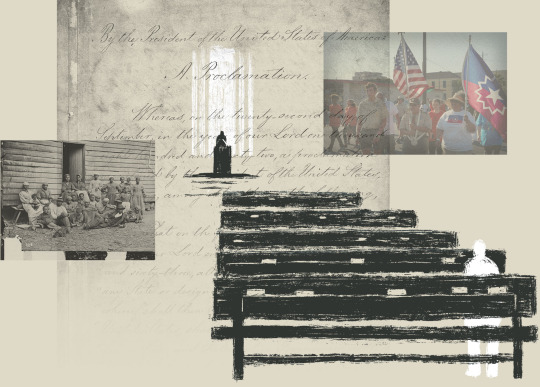
REUTERS/Photo illustration REUTERS/Photo illustration
I wondered, too, about our most powerful political leaders. How many had ancestors who enslaved people? Did they even know? I discussed the idea with my editors, who greenlighted a sweeping examination of the political elite’s ancestral ties to slavery. They also raised another question: What might uncovering that part of their family history mean to today’s leaders as they help shape America’s future?
A group of Reuters journalists began tracing the lineages of members of Congress, governors, Supreme Court justices and presidents – a complicated exercise in genealogical research that, given the combustibility of the topic, left no room for error.
Henry Louis Gates Jr, a professor at Harvard University who hosts the popular television genealogy show Finding Your Roots, told me that our effort would be “doing a great service for these individuals.”
“You have to start with the fact that most haven’t done genealogical research, so they honestly don’t know” their own family’s history, Gates said. “And what the service you’re providing is: Here are the facts. Now, how do you feel about those facts?”
And there was more to the project, something I needed to do, if only out of fairness. As a native of Mississippi who grew up in Georgia, I would examine my own family’s history. A passing remark made by my grandfather long ago gave me reason to believe my experience wouldn’t be as joyous as the advertisements I saw for online genealogy websites. Instead of finding serendipitous connections to faraway lands, I suspected I would find slavery on the red clay of Georgia.
But all of that was for work. It wasn’t for Sunday church, I thought, sitting next to my wife. My mind wandering, I looked down at the Rolex on my wrist.
This is the story that I tell myself: Those are things that I earned, paid for with hard work. I am a high school dropout. My mother is a high school dropout. My father is a high school dropout. My sister is a high school dropout. My first home was in a southern Mississippi trailer park. My mother was pregnant with me at the age of 19. My dad left our lives early.
I got my GED. I moved from a community college to the University of Georgia, working as a short-order cook while earning a bachelor’s degree in journalism.
For me, church is a place that offers a soothing sense of order, of ritual. That morning, I didn’t feel comfortable. I resented the pastor. I was there to listen to the choir and contemplate a Bible verse or two, not to be lectured. Especially about a subject I was grappling with personally and professionally.
“We would swear with our last breath that we do not have a racist bone in our bodies,” she continued. “But some of us were born in a lineage of people who take land that is not ours and enslave other people.”
Her words would come close to the facts that my reporting surfaced in the months ahead. Still, on this Juneteenth, I was done listening.
After the service, I walked to the car with my wife and sons. I didn’t talk with them about the sermon as we headed to our home on the outskirts of Washington. Ours is a street of rolling green lawns and shiny Cadillac Escalades. On the edge of the U.S. capital, a city where some 45% of the population is Black, the suburb where we live is about 7% Black. It was an inviting place for a white man to escape the pastor’s message.
That cocoon soon started to unravel. I had begun a journey that would take me back to places I held dear but had not truly known. What I would come to learn in researching my ancestors didn’t tarnish my love for family. At times, though, I did worry that I was betraying them.
It also left me with two questions I have yet to answer. What do I tell my sons about what I found, and what does it say about their country?
Introducing America
Throughout 2022, our reporting team assembled family trees for Congressional members. We connected one generation to the previous, like puzzle pieces snapping one to another, extending years before the end of the U.S. Civil War in 1865. We learned to decipher census documents written in sometimes bewildering cursive. Enlisting the help of board-certified genealogists, we became comfortable with the types of inconsistencies that surface in the old papers: names slightly misspelled, ages off by a few years, children who disappear from households as they die between censuses or marry young.
For months, my attention was drawn to the complexity of the task, and I scoured websites for documents that went beyond census records: certificates of birth, death and marriage, obituaries, military service forms, family Bibles.
The work was painstaking, and a welcome diversion. Each time I thought about building out my own family history, I winced at the subject coming close. Those were my people, my history.
Eventually, I knew I had to get started.
My wife and I were born in America. Both of us are journalists. We met in Baghdad, there to cover the war in Iraq. We married later while living in Russia, had our first son in China, our next in India. After two years in Singapore, we decided it was time to take the boys home to America, a land they’d visited on summer trips to their grandmothers’ houses in Georgia and Virginia but hardly knew.
Their introduction began less than three weeks after the May 25 death of George Floyd, as soon as we rode in from the airport. As we approached shuttered stores and boarded-up windows in downtown Washington, our younger son looked at the graffiti and banners and asked what the letters BLM stood for. My wife and I spelled it out – Black Lives Matter – and told him about Floyd’s death. Six at the time, he had no idea what we were talking about. His older brother explained the protests were to help Black people. Then he reminded him that their uncle, my sister’s husband, is Black. Our little boy went quiet. In the wake of George Floyd’s killing, protesters took to the streets across America.
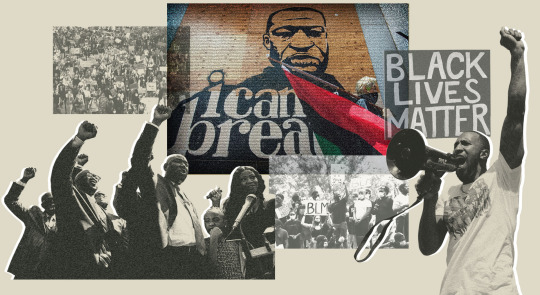
REUTERS/Photo illustration In the wake of George Floyd’s killing, protesters took to the streets across America. REUTERS/Photo illustration
Last spring I began to trace my family’s lineage in detail. I had gone through this process for dozens of members of Congress. Now I was looking at my own mom. As I started a family tree, I did not like typing her name – it felt like I was crossing a line. I opened the search page at Ancestry.com and entered the names of her parents, Harriet and Brice.
Brice was 69 or so when he visited us in Atlanta during the summer of 1994. I was a teenager. Joseph Brice James was my grandfather, but we just called him Brice. Like my own father, he hadn’t been part of our life. He lived in Chicago and had worked as a traveling salesman. The trip may have been one last effort by him to connect. He wasn’t well and would die about eight years later.
It would be that visit – really, just one line that Brice muttered – that came back to me in the summer of 2020 and started my own personal reckoning.

My Grandfather’s Words Joseph Brice James. (Courtesy: Tom Lasseter)
Here’s what I remember: Brice wanted to see the farm where his ancestors, our ancestors, lived. My mother drove, and my sister and I sat in the backseat of our family’s aged Toyota Corolla. The address Brice helped direct us to was about an hour out of Atlanta. My mother had been there before, too, but my ancestors had sold it off, parcel by parcel, starting around 1947. We pulled over in front of a clapboard farmhouse.
I wasn’t sure why we were there, or who might have once lived on the farm. Brice, a gaunt figure with closely cropped hair and large glasses, didn’t volunteer much. I walked alongside him in silence, across a field spotted with pine trees, on the edge of a lake. Then Brice paused, flicking his wrist toward an old well and said: “The slaves built that.” A moment passed and he kept walking, offering nothing further.
Those four words stayed with me, though, in the way that happens with some white families from the South: I now knew, if I wanted to, that somewhere in my history there was a connection to slavery. The farmhouse in Georgia, once owned by the ancestors of Reuters journalist Tom Lasseter.
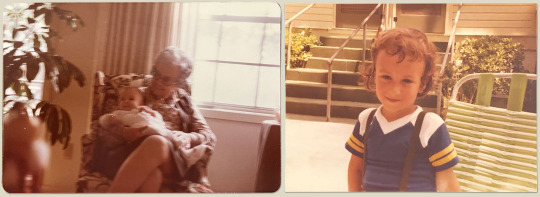
REUTERS/Tom Lasseter
Where to begin? Before prying into Brice’s side, I decided to look somewhere more familiar. The census shows my mother’s maternal grandmother as Cornelia Benson. I grew up calling her Grandma Horseyfeather, a nickname given her by my mother’s generation, the product of a long-ago children’s tale.
Looking at the 1940 census, there was Cornelia Benson of Brooks County, Georgia. I knew Brooks County as a place of Spanish moss, where we caught turtles and lizards in my childhood. I loved Thanksgiving at 618 North Madison Street, where a dirt driveway led to the back stairs and then a kitchen with long rows of casseroles. Grandma Horseyfeather, born in 1898, spoke in a slow, deep drawl. She wore lace to church. I adored her and I adored Brooks County.
At home in Atlanta, I felt lost at times, my single, working-class mom stretching one paycheck to the next. But in Cornelia Benson’s house, I felt at ease. My identity was simple: I was a white kid descended from generations of white people from the deepest of south Georgia.
As a child, I did not ask what it meant to belong to a place like Brooks County. Now I wanted to know. Cornelia Benson with Tom Lasseter as infant (left); Tom Lasseter during a childhood visit to Quitman, Georgia. (Courtesy: Tom Lasseter)
A story came to mind. I was young, and the grownups were visiting at the dining table. Someone started to tell a story about life in Quitman, the town in Brooks County where Grandma Horseyfeather lived. It was about the Ku Klux Klan and its marches.
The Klan would saunter down the street, wearing hoods and sheets, thinking no one knew who they were. The story’s punchline: All the “colored boys” – meaning Black men – knew who was wearing those sheets. They could see the shoes the white men were wearing. And who do you think shined those shoes?
I remember a tittering of laughter ripple around the table.
It was a vignette I sometimes trotted out when discussing the South. I’d shake my head and show a rueful half-frown that communicated disapproval, but not too much. My Brooks County relatives didn’t quite fit the pastor’s words. I knew they had some racist bones in their body. Still, these were my people. They didn’t mean any harm.
Reading back over the story after I wrote it down last year made me wonder what I didn’t know. So I did something that had never before occurred to me: I looked up the history of Brooks County, Georgia. It did not lead anywhere good.
In 1918, at least 13 Black people were killed in a rash of lynchings by mobs in Brooks that cemented its reputation for bloodshed. A flag that hung from the NAACP national headquarters in New York City, 1920-1928 (Source: NAACP via Library of Congress). Lynchings in Brooks County, Georgia, in the early 20th century cemented its reputation for racism and bloodshed.

REUTERS/Photo illustration
“There were more lynchings in Brooks than any county in Georgia” at the time, according to a 2006 paper examining lynchings in southern Georgia. Among the 1918 victims: Near the county line, a pregnant woman was tied to a tree and doused with gasoline before her belly was slit open with a knife and her unborn child tumbled to the dirt. The woman was shot hundreds of times, “until she was barely recognizable as a human being.” And then both her and her fetus’ burial spots were marked by a whiskey bottle with a cigar placed in its neck, according to the paper – “Killing Them by the Wholesale: A Lynching Rampage in South Georgia” – published in The Georgia Historical Quarterly.
I toggled my Internet browser to census records. Cornelia Benson and her husband weren’t yet living in Brooks County as of the 1920 census. They moved there between 1920 and 1930. I felt relieved, clean. I didn’t know any of that history. No one had told me.
But the more I learned, the more I played out the possibilities, the more troubled I felt about the Ku Klux Klan anecdote.
One morning in my home office, I pulled out a cell phone to record my thoughts about those memories. As I did, I heard the wood floorboards creaking. It was one of my sons walking outside the room. I waited for him to go downstairs before starting. When I later listened to my recounting of the Ku Klux Klan story, I noticed I’d used the phrase “Black people” rather than “Colored boys.” Without thinking, I’d cleaned the story up around the edges, making it easier to tell.
‘Mules, Oxen…and The Following Negroes’
Brice died in 2001. I never learned anything else from him about that well on the property our ancestors owned. Having read through the Brooks County material, it was time to see what I might find out about Brice’s side of my family.
I knew my grandfather was born in Canada, but that his side of the family was somehow connected to that land in Georgia. Using Ancestry.com, I found a 1948 border crossing document for him, with the names of his father and mother. I took those names and found his parents’ 1921 marriage license in Fergus County, Montana.
I noticed that his mother’s maiden name was Lila M. Brice, and that her parents were Ethel Julian and Joseph T. Brice. I looked for Ethel Brice. There she was, in the 1910 census. She was living with her daughter Lila in Forsyth County, Georgia, after a divorce – back in the household of her father, a man whose name I had never before heard: Abijah Julian.
The trip to the farm house in 1994 was in Forsyth County. The old clapboard house was built in the 1800s. And the well that Brice mentioned, the one that he said enslaved people built, sat right next to the house.
From one census to the next, I followed Abijah, a name from the Old Testament.
Information about the Julian family wasn’t hard to find once I started looking.
Working my way backwards, I learned Abijah Julian died in 1921. His passing was marked in The Gainesville News by an item headlined “DEATH OF SOLDIER STATESMAN.” Placed high in the article was the fact that Abijah Julian was part of a Confederate cavalry general’s staff during the Civil War, and that in his later years he “had been a prominent figure at all the reunions of the Confederate veterans.” The piece ended with these words: “Mr. Julian was laid to rest shrouded in the Confederate uniform which he loved.” Abijah Julian, seated, was buried in a Confederate uniform. In an account by his wife, Minnie Julian, she described him returning from war “broken in health and spirit. Negroes free, stock stolen and money – Confederate – valueless.” (Sources: Historical Society of Cumming/Forsyth County, Georgia. Newspaper clipping: The Gainesville News, June 1921)
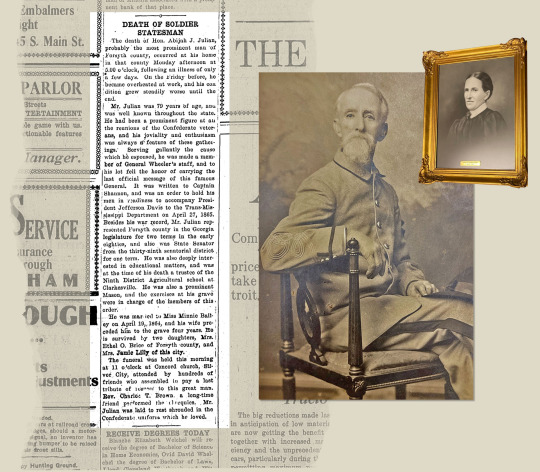
He had served in Georgia’s state legislature for three terms. I looked for more details about him and his ancestors before the Civil War.
Abijah’s father, also a member of the state legislature, died in 1858 at home in Forsyth County, according to press reports. It was just a couple months before Abijah’s 16th birthday.
Some four years later, Abijah went to war against the United States. In 1864, a year before the Civil War ended, he married a woman in Alabama, the daughter of a doctor, who moved to the Julian farm. In an account by his wife, Minnie Julian, she described Abijah returning home after the war, “broken in health and spirit. Negroes free, stock stolen and money – Confederate – valueless.” In the very next sentence, however, she noted they still had 600 acres of land.
Her words signaled that Abijah had enslaved people. But I needed more proof.
In addition to the usual household census forms, in 1850 and 1860 the U.S. government created a second document for the census takers to fill out in counties in states where slavery was legal. It’s referred to as a slave schedule, and it lists by name men and women who enslaved people, under the column “SLAVE OWNERS.” The form gives no names of the human beings they enslaved. Instead, it tabulates what the document refers to as “Slave Inhabitants” only by the person’s age, gender, color (B for Black or M for Mulatto, or mixed race) and whether they were “Deaf & dumb, blind, insane or idiotic.”
After you find a slaveholder on the household census form, matching them to the slave schedule can be complicated. In some counties, multiple men of the same or similar name enslaved people. And of course, not every head of household in a county enslaved people, so fewer names are listed on the slave schedule than on the population census. Fortunately, the households on the two documents are typically listed in the order they were counted by the census-taker – meaning if you see the same residents’ names close by, in the same sequence, you’ve likely found the same person on the two forms.
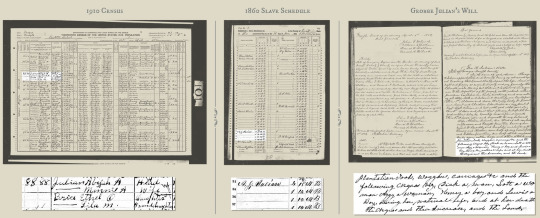
In 1860, on a slave schedule in Forsyth, I found my ancestor listed on line 34 as A.J. Julian. He was 17-years-old at the time. There were four entries for his “Number of Slaves” column – four males, ages from 10 to 18.
There was more. When Abijah’s father, George Julian, died in 1858, he left a will.
One key to unlocking the identities of those who were enslaved is through the estate records of white families who claimed ownership of them. In many cases, wills give the first names of the Black men, women and children bequeathed from one white family member to another.
In his will, George listed property “with which a kind providence has blessed me.” To wife Adaline, George bequeathed “mules, oxen, cattle, hogs and other stock, and plantation tools, wagons, carriages and the following Negros…”
There were five enslaved people left to George’s wife, the will said, with the provision that “the negros and their increase” – that is, their children – would go to Abijah after his mother’s death. George Julian also left four enslaved children to Abijah, himself a teenager at the time.
And, in a separate item, Julian wrote that an enslaved woman and three children should “be sold” to pay his debts.
The will was difficult reading. Lumped in with oxen and kitchen furniture, plantation tools and wagons, were human beings. And “their increase.”
The will listed names of the enslaved kept by the family: Dick, Lott, Aggy, Henry, Lewis, Ellick, Jim, Josiah and Reuben.
The document was dated 1858 – close enough to emancipation that I might have a chance at tracing some of them forward, especially if they used the last name Julian. Perhaps there would be a chance of finding those same names in Forsyth in the 1870 census, when, finally free, Black people were listed by name and household.
Something kept happening, however, when I looked for those names. I’d see likely matches in one or two censuses, and then they disappeared after the 1910 census in Forsyth.
It took me a few minutes of research to figure out why I was losing track of the descendants of the people George Julian enslaved. It was a history drenched with blood, and it drew much closer to mine than I had realized.
The Search for Descendants of The Enslaved
ATLANTA
In 1912, Virginia native Woodrow Wilson became the first Southerner since the U.S. Civil War to be elected president. And the white residents of a county in Georgia, where my ancestors lived, unleashed a campaign of terror that included lynchings and the dynamiting of houses that drove out all but a few dozen of the more than 1,000 Black people who lived there.
The election was covered in the classrooms of the Georgia schools I attended. If the racial cleansing of Forsyth County was mentioned, I didn’t notice.
That history explains the difficulty I had looking for the descendents of the people enslaved by my ancestor Abijah. By 1920, their families and almost every other Black person had fled the county.

From left: The Forsyth County Courthouse in Cumming, pictured in 1907. Built in 1905, it was destroyed by fire in 1973. (via Digital Library of Georgia). The Atlanta Georgian newspaper reports on the lynching of Rob Edwards, September 10, 1912. (Source: Ancestry.com). U.S. President Woodrow Wilson.
They were forcibly expelled under threat of death after residents blamed a group of young Black men for killing an 18-year-old white woman in September 1912. A frenzied mob of white people pulled one of the accused from jail, a man named Rob Edwards, then brutalized his body and dragged his corpse around the town square in the county seat of Cumming. Two of the accused young Black men, both teenagers, were tried and convicted in a courtroom. They too died in public spectacle, hanged before a crowd that included thousands of white people.
There were also the night riders, white men on horseback who pulled Black people from their homes, leaving families scrambling and their houses aflame. The violence swept across the county, washing across Black enclaves not far from the farm where my ancestor, Abijah, lived at the time.
In 1910, the U.S. Census showed 1,098 Black people living in Forsyth. Ten years later, the 1920 census counted 30.
‘Night Marauders’
Until last year, I had never heard of this history. I had a dim memory of news reports about white residents in Forsyth attacking participants in a peaceful march for racial equality – not during the tumultuous Civil Rights era but in the 1980s. I watched video clips from an early episode of “The Oprah Show” – a telecast from 1987 when talkshow star Oprah Winfrey went to Forsyth to try to make sense of what was happening there. Some locals in the audience were unrepentant. Footage shows that crowds on the street and a man, to Oprah’s face, were not shy about using racial slurs on national television.
I learned about the 1912 violence in Forsyth after a genealogist who worked with Reuters sent me a note pointing out that my ancestor Abijah Julian appeared in Blood at the Root, a 2016 book that chronicled the bloodshed there. I already knew Abijah had enslaved people and adhered to the “Lost Cause” – the view that the South’s role in the Civil War was just and honorable.
About four months after the terror in Forsyth began, Abijah wrote a letter to the governor of Georgia in February 1913. He was asking for help to quell the chaos unleashed by “night marauders” who had “run off about all of the negroes.” Here’s part of his letter: A letter Abijah Julian wrote to the governor of Georgia.
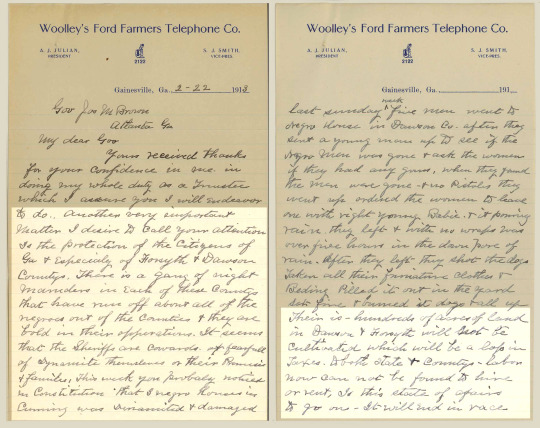
(Courtesy: Kenan Research Center at the Atlanta History Center.)
During that week alone, Julian wrote, “3 negro houses” in Cumming had been damaged by dynamite. The letter did not suggest any anguish for the Black people who’d been terrorized. What concerned Abijah Julian was his fields and who would farm them.
The Julian land stretched hundreds of acres across Forsyth and neighboring Dawson counties. Abijah told the governor that large swathes of land “will not be cultivated” because “labor now can not be found to hire...”
Gov. Joseph Mackey Brown referred to the situation Julian highlighted later in 1913, in a written message to members of the state senate:
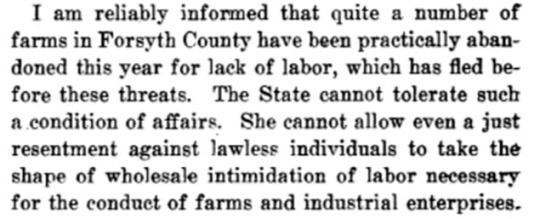
After all, the governor continued, “there is no reason why farms should lose their productive power and why the white women of this State should be driven to the cook stoves and wash pots simply because certain people blindly strike down all of one class in retaliation for the nefarious deeds of individuals in that class.”
What happened in Forsyth was not unique. White people across the South had been pushing back against political and economic progress made by Black Americans after the end of slavery and would continue doing so.
In 1906, a white mob stormed downtown Atlanta, killing dozens of Black people and attacking Black businesses and homes. In 1921, a white mob destroyed a Black community in Tulsa, Oklahoma and, according to a government commission report, left nearly “10,000 innocent black citizens” homeless. The death toll was in the hundreds.
Once you begin to look, such violence stretches on and on, decade after decade.
Still hopeful that I might be able to somehow identify and locate living descendants of the people my family enslaved, I flew to Georgia last November.
‘Dick a Man, Lott a Woman’
While I was in Atlanta, I asked my mom and sister if they had time to talk about what I’d found. We sat one evening at the dining room table in my mother’s house, the same table on which we had once shared Thanksgiving dinners with Grandma Horseyfeather.
I had prepared two thick packets of documents that outlined our family tree, each with underlying records, to walk through the lineages of our slave-holding ancestors in three Georgia counties, including Forsyth.
I explained that my search began with a memory of walking with my mother’s father across some land our people used to own in Forsyth; and my grandfather casually remarking of the old well: “The slaves built that.”
“It added up from this one, just sort of little vague memory that I had of Brice gesturing at a well.”

The first question came from my sister, who is married to a Black man. Her voice was stretched thin with emotion. She asked: “Is there any possibility of doing the same for the people that our family enslaved?”
I’d found a man in Grandma Horseyfeather’s lineage who was a slaveholder and likely worked as an overseer in Jefferson County, Georgia. But neither I nor the genealogists we consulted could identify descendants of those he’d enslaved.
“So I’ve – I’ve tried,” I explained. “The issue is that the best details that we have are in Forsyth County, but in Forsyth County they forcibly expelled all of the Black people.”
There were, however, names of enslaved people who were bequeathed in the 1858 will of George Julian, Abijah’s father. At least two seemed to fit with a lineage I could trace.
Listed in the will as “Dick a man” and “Lott a woman,” they looked like a possible match for a couple living three households from Abijah Julian’s uncle in the 1870 census. Their names were listed as Richard Julian and Charlotte Julian. Was Dick short for Richard? And was Lott short for Charlotte?
I noticed that Richard Julian had an “M” in the column for Color. The M stood for Mulatto, someone of mixed race. Charlotte was 32 years old in 1870, an exact match for a 22-year-old enslaved woman listed on the 1860 slave schedule as belonging to George Julian’s widow. Richard was listed as 30 in 1870, which did not line up as neatly with an 18-year-old enslaved man next to Abijah Julian in the 1860 slave schedule.
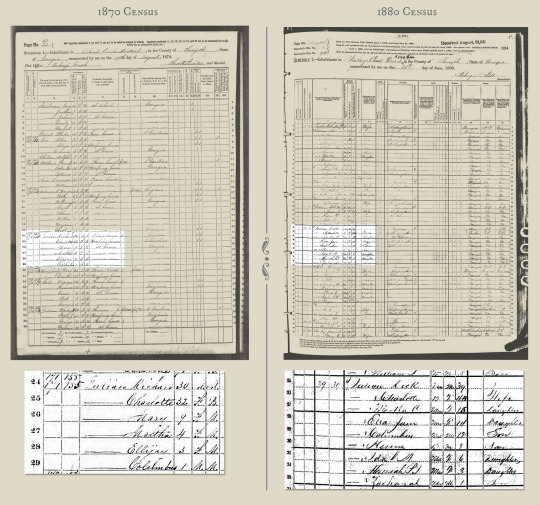
A comparison of the 1870 census and the 1880 census reinforces that Reuters journalist Tom Lasseter is following the same family from one decade to the next. (Source: Ancestry.com)
Still, based on the mention of the names Dick and Lott in George Julian’s will, I followed the Black family’s lineage from one census to the next.
In 1880, Richard was listed as Dick. Lott was there, too, as Charlotte. And their ages were close to what they should have been – about 10 years older than in 1870. The children listed in each census gave me confidence I was following the same family. In 1870, four children were listed. There were three girls and a boy. In 1880, the oldest child was no longer there; she would have been 19 or 20 and may have married. But the boy and the two other girls were there, names and ages matching. The Julians had added four children to the family since the previous census, too, the eldest 8.
My sister’s first question after I traced our family tree that night lingered: “Is there any possibility of doing the same for the people that our family enslaved?”
One of the children in the 1880 census would provide the path.
The Shacks
The day I arrived in Atlanta, November 1, I chatted with my mom about Forsyth and our family’s history there. She’d mentioned something that took me aback.
“When we were talking about the farm, you said there was a slave shack, a slave shed?” I asked her the next day. “What was that?
It turns out my mother had visited the Julian farm when she was a kid. Someone had pointed her to a pair of shacks on the farm and explained that they were where the families of the enslaved used to live.
“It was a structure – by the time we came along it was still on the property but it was, like, a wooden structure that was falling apart.” Her voice became low for a moment. “And that’s what we were told that it was. And I think – I don’t know.” She paused. “I know my grandmother talked about teaching people how to read, or people in her family having taught some of the slaves how to read.”
My mom, a slight woman with a calm voice who works as a nurse with organ transplant patients, was uncertain about the details. “I’m not sure what the – it was just information that she was sharing, maybe to make it feel better that they had slaves. I don’t know.”
I went to dinner with my mom at a Thai restaurant the following evening. I’d been in Forsyth that morning, looking at some documents about the Julian family. She asked me if I learned anything new. I told her about two murders in the family – a pair of sisters slain by the husband of one – that had been covered in the newspapers in the 1880s.
That’s not what she was asking about. My mom looked up from her tofu dish and said, “I am uncomfortable with how little attention was paid to what that was.”
Under her breath, she continued: “The shed.” She meant the slave sheds on the Julian farm.
She said nothing for a few moments. And then she explained, “I was 11.” It was her way of saying she was young at the time. What could she have known about such things? It was the same age as my eldest son.
Why was I putting this at her feet? I thought.
What did she have to do with a white man, dead now for a century, who got rich and enslaved Black people? Where was that money? Not in her pocket. She was working late shifts and driving a beat up Toyota with a side mirror attached to the car by duct tape.
But the feeling of indignation was mine. My mother, a child of the 1960s who took us to downtown Atlanta for parades on Martin Luther King Jr Day, wasn’t being defensive. She was trying to work through what it all meant.
An Unexpected Meeting
Just before Thanksgiving last year, I reached out to a young research assistant at the Atlanta History Center. I’d heard she was tracing descendants of people who fled Forsyth.
Over the phone, I told Sophia Dodd that I was looking for people with the last name Julian. She said she had someone in mind. But first, Dodd would need to check with the person; we arranged to meet in Atlanta later in the month. There was a possibility the person would join us, she said, “but I also know they’re in the midst of traveling so that’s a little up in the air right now.”

I met Dodd at her office a few days before Thanksgiving, ready to ask her questions about Forsyth County.
And then another woman walked into the Atlanta History Center: Elon Osby. She wore a cranberry-colored top and glasses with red cat-eye frames. The 72-year-old Black woman with gray hair shook my hand and said, yes, she would gladly take me up on a cup of coffee.
I hadn’t expected her. I’d not even known her name – Dodd had protected her privacy while Osby decided whether to meet me. But there Osby was, looking at me expectantly. The three of us headed to Dodd’s office.
Without my census forms in hand, I felt exposed. Those family history packets – the ones I shared with my mother and sister – were a way to guide the conversation. And this conversation was with a stranger whose history with my family may have involved slavery. I told Osby that I regretted not having materials to give her.
Osby looked me over. She got to the point. “Is it that you feel that your ancestors were slaveowners of mine?” she asked.
Because I hadn’t done a family tree for her, I explained, I couldn’t be certain. During months of examining the lineages of American politicians, we had held to a firm standard: a slave-owning ancestor needed to be a direct, lineal ancestor – a grandfather or grandmother preceded by a long series of greats, as in great-great-great-grandfather.
As I built my own family lineage, I knew that the Julians were slaveholders. But when I worked with the genealogists on our team to trace the enslaved people named in George Julian’s will, they urged caution. What wasn’t entirely clear: Exactly who had enslaved Richard and Charlotte? Was it George, or was it George’s brother, Bailey?
I offered Osby the abridged version. If she were a direct descendant of Richard and Charlotte Julian, “they were enslaved either by my direct ancestor, George H. Julian” – Abijah’s father – “or his brother.”
As I finished my sentence, I realized the distinction may have been important to the journalist in me. But in this context, it was meaningless. What mattered wasn’t in question: Someone in my family had enslaved hers.
Osby turned to Dodd, the young white woman who’d been helping her research her family.
“First of all, let me ask this.” Osby said. “Do any of these names that he mentioned ring a bell with what you’ve done?”
Dodd answered quickly. “Yes, so I think that it’s definitely very possible that Charlotte and Richard were enslaved by George,” she said.
I asked Dodd if she had an account with Ancestry.com and whether she could print some documents. Together, we navigated to the 1858 will for George H. Julian and the 1870 census forms that showed Richard and Charlotte Julian.
Osby had explained that her grandmother’s name was Ida Julian. And Ida Julian’s parents were Richard and Charlotte Julian of Forsyth County.
Ida. Daughter of Richard and Charlotte. I would see it later. Not in the 1870 census, because Ida hadn’t yet been born. But there she was, listed in the 1880 census. Ida Julian, age 6. Ida Julian, listed in the 1880 census as a young child. (Source: Ancestry.com)
I later found a marriage certificate showing that Ida Julian married a man named WM Bagley in 1889. She was young, perhaps 15. By 1910, the census showed them living in Forsyth County, the parents of three girls and a boy.
The youngest of their children, not yet a year old, was a girl recorded as Willie M. She would go by Willie Mae Bagley, get married, and become Willie Mae Butts – the mother of Elon Butts Osby. The former Ida Julian, now Ida Bagley, in the 1910 census. Her daughter, listed as Willie M., would become Elon Osby’s mother. (Source: Ancestry.com)
After we had worked through the small pile of papers that Dodd had printed, I asked Osby what it meant to see some of those documents.
“It makes people real now. It just makes all of this more real. And it has started a journey for me,” she said, adding that there’s “no telling where it’s going to go.”
I asked her what her family said about Forsyth County when they discussed it with her as a girl. “They didn’t. They didn’t talk about it,” she said.
It wasn’t until around 1980, when Osby was about 30 years old, that she heard her mother tell a reporter the story of her ancestors fleeing the county by wagon because white people were attacking Black families.
“There wasn’t any conversation about it,” Osby said. “But she did talk about her grandfather had this long hair, straight hair, and they would comb it.” That was Richard Julian, Osby’s great-grandfather, the man listed as a “Mulatto” on the 1870 census.
She paused and stared at my face for a moment.
‘I Don’t Think You Can Get Justice’
When Elon Osby’s grandmother, Ida Bagley, and her family fled Forsyth, they left behind at least 60 acres of land, she said.
They made their way to Atlanta after 1912, the year of the carnage. There, in 1929, her grandfather, William Bagley, bought six lots of land in a settlement of formerly enslaved people known as Macedonia Park, according to the local historical society.
It was located in Buckhead, long among the most expensive neighborhoods in Atlanta. The Black residents of Macedonia Park worked as maids and chauffeurs for white families in the area, as golf caddies and gardeners.
Osby’s grandfather made money as a cobbler and local merchant. Her parents opened a store and a rib shack. Her father was also a butler for a wealthy white family, her mother a cook. The area became known as Bagley Park, and her grandfather, according to a historical marker now at the site, was considered the settlement’s unofficial mayor. William Bagley, Elon Osby’s grandfather, was known as the mayor of Bagley Park, a Black enclave in Atlanta that was later razed by the county.

(Courtesy: Elon Osby)
In the late 1930s and early 1940s, nearby white residents – members of a women’s social group – petitioned the county to condemn and raze Bagley Park, ostensibly for sanitary reasons. It had no running water or sewer system. The county, which had not provided those services, agreed, forcing the families to leave. They were compensated for the land, but it’s not clear how much, and in the process they lost real estate in what is a particularly affluent quarter of the city.
Osby’s family had again been pushed off its land. The settlement was demolished and replaced by a park, later named for a local little league umpire. Last November, the city of Atlanta restored the area’s name: Bagley Park.
In thinking about Osby’s family and my family, I found it was impossible not to compare them – and the role slavery played in our respective paths. In 1860, Osby’s ancestors were enslaved and working the fields of Forsyth County. In 1860, my ancestor Adaline Julian, widow of George and mother of Abijah, reported a combined estate value of $19,020. She was among the wealthiest 10% percent of all American households on the census that year. And that wealth didn’t include her son’s holdings. Then just a teenager, Abijah had a personal estate of $4,828, according to census records. That amount lay largely in the value of the enslaved people bequeathed to him by his father.
In 1870, Osby’s ancestor, Richard Julian – free for only about five years – was listed on the census as a farmhand, with no real estate or personal estate to report.
In 1870, Abijah Julian – despite having “lost” those he had enslaved – still had a combined estate of $4,655. That put him in the top 15% of all households in America, census records show.
Osby said her parents used the money they got from the government after being forced out of Bagley Park to buy land in a different part of Atlanta. They continued to work hard. Her father was hired as an electrician by Lockheed, and her mother ran a daycare business.
Osby spent a career working in administration. She said she started as secretary for the manager of the city’s main Tiffany & Co location in 1969, then worked in various city government offices, and now for the Atlanta Housing Authority.
After she’d finished telling me about her family and herself, I asked Osby whether she would mind me recording some video with my cell phone. I asked once again about her family’s reluctance to discuss Forsyth. She repeated that Black parents had long kept such things quiet. I noticed she added the words “rape” and “lynchings.”
But, she said, she has seen considerable progress during her life. Osby, whose family was forced out of Forsyth in 1912, was the keynote speaker in 2021 at a dedication event in downtown Cumming, where a plaque memorializing the bloodshed in Forsyth had been installed. And Osby, whose family was forced with others to leave their neighborhood in Fulton County, is now a member of the Fulton County Reparations Task Force. The group advises the county board and has sponsored research on what happened at Bagley Park, including a report documenting what Osby already knew: that “property owners in Bagley Park were forced to liquidate their real estate, a vital link in the chain of generating generational wealth.”

“There was a time when I didn’t feel that restitution or reparations was necessary” for the land taken from Black families after 1912 in Forsyth, and then what followed in Bagley Park, Osby said.

“I just want somebody to acknowledge it and say, you know, we’re sorry. But I have come to realize, or come to feel, that we do need to receive something in the form of restitution. I think that the main thing is, if you touch people in their purses they’ll think before they let something like that happen again. I think it’s mainly about [how] we can never let this happen.”
As for her enslaved ancestors, Osby had a different outlook on reparations. “I don’t want to think of slaves as property. And if I have to give you a value for a slave person so that you can, you know, give me reparations for that – then that’s making them property. That’s reinforcing that idea that they were a piece of property for somebody to own.”
I asked her what it meant to know that history – to know more about what happened during slavery in such personal terms. To know that my own ancestors enslaved people. Osby puckered her bottom lip, paused for a moment and sighed.
She pointed her left index finger at me and said it was a question for me to answer. How did I feel, she asked, when I found out my ancestors enslaved people?
‘What Does It Mean to Know This?’
I told her the story of the old well and my grandfather. I told her about the reporting project, about finding out that my family enslaved people not only in Forsyth, but at least two other counties as well.
Finally, I stopped talking. In my mind, I had run through the right things to say. In a blur, I wondered: Should I apologize to Osby, to her family on behalf of mine?
Instead, I decided to talk about what made me most comfortable: the journalism itself. “A lot of it has been just establishing, sort of, the facts – figuring out, this is who they were, this is what happened,” I said. “I guess sitting here right now I don’t have an answer for – I don’t have an answer for my question” on the value of discovering more about slavery.
She leaned back and laughed.
At some point, I lowered the camera from chin height to the table. My hands were trembling. I was based in Iraq for three years. I sat with militants in Afghanistan. I know what mortar and machine gun fire sound like, at very close range. But at this little table, before this woman, I felt nervous.
I kept talking. I talked about how we – meaning white people – choose to know but not know. I told her about my mom remembering the decrepit former slave sheds on the Julian farm.
Osby no longer was smiling.
She began to talk about something that circled back to her comments about her great-grandfather’s straight hair, her curiosity about possible Cherokee Indian heritage. And, also, to rape.
“Black people, we’ve always known either through the movies or if you’ve learned it, you know, from your family, about the interracial relationships that happened on these plantations or whatever,” she said. “My grandmother – very, very fair skinned. I have one picture of her where she, you know, looks like she’s white. And so, you know that somebody else was there. You know?”
Somebody else was there. It was a phrase with a passive structure common to the South, a way of not assigning blame to the person sitting across the small table from you in the corner of an office. The meaning nonetheless seemed clear to me: Did my ancestor rape her ancestor?
“I’m curious, and that’s one reason why I was excited about coming to speak with you because I want to find out about the Cherokee part,” she said. “And also, if there was a white person, you know, that was, her – whatever,” she said, cutting the sentence short and fluttering her hands in the air.
I told her that I’d done a DNA test online. She said she was considering taking one as well.
After we spoke, Osby asked me to go with her to the graveyard at Bagley Park. I followed her Mazda. Its license plate read MS ELON. Her grandparents were buried there, she said, but she couldn’t say where. The gravestones had been vandalized over the years, Osby explained, looking at the broken markers.
Panic and Questions
After we parted, I drove to Forsyth County and the Julian farm. I could see across the road to the spot where my mother described the slave shacks having once stood.
The door was locked, the farmhouse empty. I stood outside the white clapboard home and stared. The leaves crunched underfoot, down at the end of Julian Farm Road. I rested my forearms on a dark slat fence and scanned the property, a utility shed to the right and a patio to the left.
I did not see the well.
I walked to the front of the house and looked for it. The well wasn’t there. I went to the back edge of the land, which now sits on the shore of a man-made lake that flooded part of what was once Abijah Julian’s farm. Nothing. The waters of Lake Sidney Lanier near what was once a farm owned by Abijah Julian. The lake, created in the 1950s, flooded parts of that farm. REUTERS/Tom Lasseter
I felt panicky. The well, the totem of my memory and the genesis of this project – “The slaves built that” – was nowhere. Was it possible I had mixed up some other memory, that it was never at the Julian farm?
I walked over to a step behind the house and sat down. My thoughts about the well gave way to replaying parts of my meeting with Elon.
Should I have apologized to her? “I am sorry,” I could’ve said. “I am sorry that my ancestors brutalized your ancestors.” What had stopped me?
The next day, I sent a text message to the man who now owns the Julian property. Did he know anything about an old well? “Yeah, there was a well next to the house that was dried up. We covered it,” he replied. He sent me a photograph of the front of the house from a 2019 real estate listing. And there it was – the well I remembered, at the far right of the picture.
I peered at the photo. I read the listing. The lake that flooded part of the farmland had created 209 feet of waterfront that now featured four boat slips, according to the advertisement for the property. It noted the farmhouse was “originally built in the late 1800’s by the family of State Senator Abijah John Julian” and added another dash of history: the Julian family was “of the Webster line circa 1590 England.” There wasn’t a word about the other side of the Julian family history: slavery.

Instead, under the section for what the seller loved about the home, was this line: “Your own private plantation.”
What Should Be Handed Down?
In the months after my visit to Forsyth, I’ve looked at a video of the church service that I attended last summer on Juneteenth, the national holiday marking the end of slavery. At the time, I had bristled at the pastor’s remarks, which centered on the need for white people to face our history, to atone.
Toward the beginning of the service, the children had been sent to Sunday school. So my sons weren’t sitting next to me when the pastor said, “We’re asked to stay home and to reflect with those who we know and whom we love – we’re asked to … have the difficult conversations about race and status and prestige and wealth.”
There was another detail that I hadn’t associated with that day’s sermon. It wasn’t only Juneteenth; it also was Father’s Day. From a 2019 real estate listing. The well is seen at the far right in this photo of the front of Abijah Julian’s house.
I’ve thought more than once about all that I had missed. About what to tell my children about everything I’ve learned in the past year. About our family’s part in slavery and the descendants of those we enslaved. About my conversation with Elon Osby.
What should be handed down, and what should not?
Getting ready for a reporting trip last year, I was sifting through online documents from an archive in south Georgia.
I came across a photograph from 1930 of white men sitting in front of an American Legion post. They each wore a medal on the left lapels of their suit jackets. I zoomed in and saw what had caught my eye. It was the cross of military service, handed out by the United Daughters of the Confederacy to World War I veterans who were direct descendants of Confederate soldiers.

In a little white box on a shelf in my home office, I have that same cross. It had been given to my great-grandfather, from Brooks County. After my great-grandmother Horseyfeather died, my family gave it to me, the ever-faithful son.
I fished the cross from its box and turned the thing around in my fingers. The cross was decorated with an X formed by two stripes of stars immediately recognizable from the Confederate battle flag. Around the edge, in the background, are a Latin phrase and two dates: Fortes Creantur Fortibus 1861-1865. The years are those of the Civil War. I Googled the phrase. It means the strong are born from the strong.
I’d had that cross for about 25 years and always associated it with my great-grandfather’s service in World War I, its dates marked in the foreground. I had never stopped to look more closely.
Peering down at it now, I realize it also meant something more: a loyalty to the South when it was a land of slavery and secession.
I was holding on to a relic of the Lost Cause, a history of savagery cloaked in nostalgia. I was holding on to something that I needed to explain to my sons, and then to let go. As I type these words, I have yet to have that conversation. The medal remains on my shelf.
Apology and Absolution
I met with Elon Osby once more earlier this month. We walked again through the cemetery at Bagley Park, where somewhere her ancestors are buried, their gravestones long gone. We stopped at a picnic table. I asked her about the last time we met, reading some of our quotes out loud and talking through what each of us had meant.
There was rain coming, with dark clouds, then lightning. I told her that I’d been nervous during our initial conversation. She asked whether I thought the guilt had been passed down: “Most white people do not have ancestors that owned slaves,” she said. I pointed out that I have at least five.
I said that I’d wondered if I should have apologized. “No,” she said, “I don’t transfer the guilt. Or not the guilt, but the responsibility of it. I don’t do that.” I said with a nervous laugh that I wasn’t asking her to absolve me.
The lightning drew closer. It was time to leave. “We’ve probably covered everything,” Osby said, gesturing to get up.
But I wanted to say more. Ignoring the rain, I reached for the words I hadn’t found during our first meeting: “I’m very sorry that it happened. You know, that all of that happened. And I feel that every time I look through those wills and the language that they used. And that 1858 will – listing furniture and livestock and then human beings. You know, I can’t help but be sorry.”
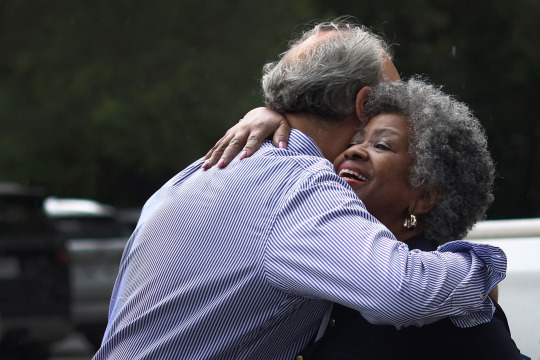
Osby stopped and looked at me. Listening to the recording later, I could hear the wind and the rain in the background. And then her voice. “It doesn’t feel good at all when you see the horses and cows and slaves. You know, it doesn’t feel good at all,” she said. “But at the same time, it happened. It happened to my people. I don’t want to forget about it.”
She pointed at the packet of genealogical material I’d brought along, mapping our families and that terrible history long ago in Georgia. “This is good enough. What you’re doing for me and my family, bringing this information to me.”
She let a moment pass, and then said: “You’re absolved.” She threw her head back and let the laughter roll like thunder. As the rain fell, we walked to the parking lot together. We paused, then hugged before parting.
“The Slaves Built That”’
By Tom Lasseter
#georgia#slavery#slave records#reuters reporter explores his slave owning roots#“The Slaves Built That”#white supremacy#Blacks Enslaved in America#forsyth county#lynching#stolen land#stolen heritage#ancestral dna
5 notes
·
View notes
Note
You certainly aren’t a racist for liking Pocahontas, let’s get that clear. You can draw what you want to draw. But with that, let me give you an American perspective on why someone might have been upset.
The movie (with an amazing soundtrack and visuals) has gained a lot of criticism over the years because of its depiction of Native Americans. A common stereotype is that Native Americas were essentially hippies who chilled out in the forest and worshipped nature and smoked pipes before white people came along, and that’s not a good thing because it treats multiple tribes as a giant monolith (meaning that they are all basically the same) and continues to spread misinformation about multiple different cultures.
I will admit that I was really wary seeing your illustration. Not because it was bad (far from it), but from an American perspective and from the context of history of how white/European colonizers came and took land that wasn’t there’s, purposefully infected tribes with scarlet fever to wipe them out, stole resources, etc, you are technically putting Peeta into that role through your work by drawing him as John.
And because the movie stereotypes Native Americans, having Katniss as this Pocahontas like figure also puts her into that role of “hippie native princess” like the movie did. That’s why people might have gotten upset.
Again, this person had absolutely no right to call you a racist because you aren’t. They’re just being stupid. 🙄🙄🙄🙄. But it’s important to understand there is more than just a film thing, there’s a lot of historical background to it and a lot of it is really bad.
If you want to put Katniss in a Native American role for art, check out the Seminole tribe, the Chickasaw tribe, the Choctaw tribe, or the Creek tribe! All of them were/are situated in the southern United States where I believe 12 is meant to be! Correct me if I’m wrong.
Thank you dear ;) I think your way of explaining things is a lot better than aggression and hatred.
I think sometimes people forget that we all have different backgrounds and what is obvious to you is absolutely not that clear for other people. Being from another part of the world I can’t fully understand the delicacy of this topic so I should have done a disclaimer or something like that probably. Or I shouldn't have drawn this at all, yeah.
Anyway, I’m ready to apologise once again. My illustration was made to represent love, not hatred. I’m sorry if it looked offensive.
I’m not sure I’m ready to draw Katniss as NA ever again. Maybe I will just stick close to the books and that’s all. We’ll see. But thank you for information. I will definitely read about it ;)
42 notes
·
View notes
Text
kulan cafe
🇸🇴 somali
📍 skyline aka build america plaza in bailey's crossroads, falls church, virginia
📅 dinner; July 2023. 1st time

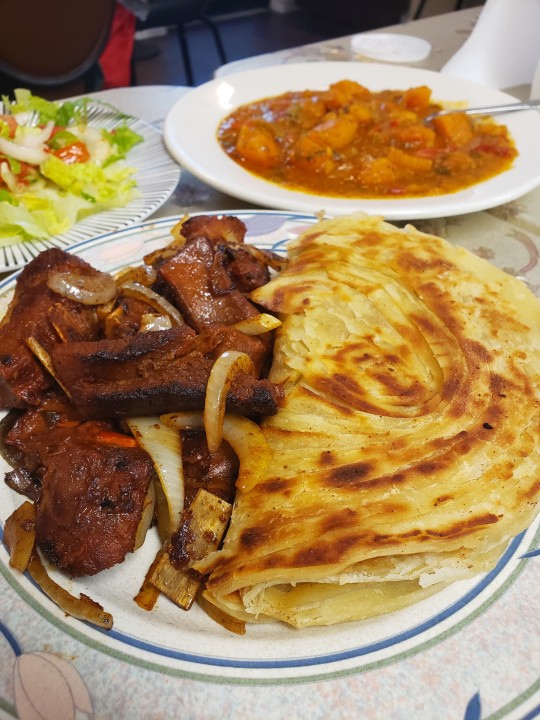
😋 overall: I literally have no metric for somali food but since it's the only one of its kind in the area, I hope it sticks around. I love getting surprise sides, and they know how to season their damn meat!!!! I'd come back in a heartbeat.
more food pix + detailed review under the cut!
🍵 not pictured is the tea we ordered, 1 cup each. it came out PIPING HOT so we had to wait a bit, but it was so wonderfully spiced (cardamom?). sweet too, but a little too sweet that it got a little cloying once it cooled down. at room temp, all the spices made it taste a little medicinal; reminded me of a natural cough syrup or something. I'd order it again but drink it while it's still hot.
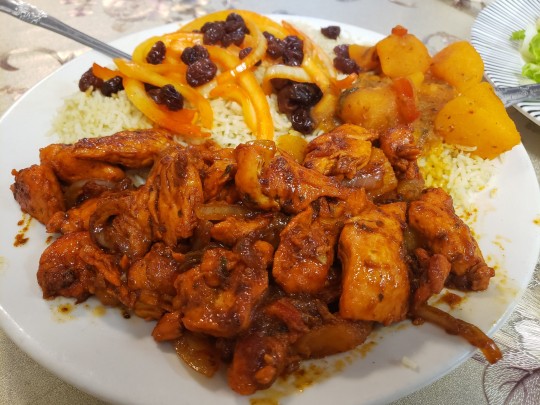
🍚🐔 rice w/ chicken suqar - this was my fav dish! the chicken was soooo tender and well-spiced (not much else you can say about it when you can't identify spices that well lmfao all I know is that i loved every bite). the rice took up half the plate and then some! I loved that it came with raisins; it reminds me of afghan pulao.
I would SO get this again!!!!!!
🥗 didn't take a separate photo of the salad that came with this dish but it was pretty good. I liked taking bites of it in between these heavier meat dishes. the vinaigrette helped lift it! I'd get it again.
it reminds me of the side of salad that kabob places usually include. I wonder if salads are a western influence and what kinds of vegetables are native to Somalia.

🫓🐑 sabaya w/ lamb - it's always a gamble getting lamb or goat from restaurants but I'm so glad I did cos this lamb wasn't dry whatsoever and I loooved the spice rub on it. there were some chewy parts that I had to spit out but it was prob tendon so that's to be expected.
also I was drooling the moment I saw them bring out this plate cos the flatbread looked sooo flaky BUT it ended up being chewy and dry af 😔 it was difficult to pull apart 😢😢😢 I'm genuinely so sad about this cos it prevented this whole meal from being a solid 10
I wouldn't get a dish with sabaya again. I'd have a dish with lamb again tho! maybe I'll try their pasta next time.

🥘 unknown side that has potatoes, peas, and ??? - lol right after the cashier/server brought out the sabaya w/ lamb, he was like "I'm not done!!!" and brought out THIS DISH. and then he was like "NOW the dish is complete." thank god he did cos that sabaya needed moisture... badly
didn't even know that the dish even had sides so i'm not sure how to get it again... but I definitely want it again. I love tasting a delicious spice combination for the first time 🥰
they brought this out a little late into the meal but they also gave us a bowl of their house-made hot sauce, which was made of jalapenos. it wasn't that spicy (tbf the server told us that as he put it down) but its freshness helped lift some items.
-----
💲 price - $17-$20 for each plate, which I think is fair given the generous portion sizes. definitely stuffed 2 people, with some food left over (mostly carbs haha)
🗒️ other notes - it didn't taste salty or anything while I was eating but once I got home, i was SO THIRSTY i downed half my water bottle like a whale. 🐋
anyway the cashier/server was really friendly to us. after he asked us to rate the food, he made a point to tell us that everyone cooking this food is family and actually from somalia, not like "other restaurants" (who most likely have latino people working in the back).
this plaza feels like the ethiopian version of eden center. hoping i'm not cursing the place as I write this but I wonder when fairfax county will start drooling over the land as ripe for redevelopment and ethiopians will have to organise for anti-gentrification like viet folks are rn (if you're reading this, follow viet place collective)
2 notes
·
View notes
Note
Hi, Did you see the episodes titles of S5? And are you inspired by them? Any ideas? Thank you
Hey! Thanks for the question anon 🥰
I mention some things from The Testaments that can be considered spoilery
Yes I did, exciting!!! They seem interesting 🤔. I’ve had thoughts lol but I’m really going back and forth with the few spoilers we’ve gotten and how the show has progressed in 4 seasons. One of the things I really enjoy about this show is how consistent character development has been. I did see slight hints during season 4 that they were moving towards tying to The Testaments.
The one that really pulls me is Dear Offred. I remember the conversation between June and Fred and the “I miss her sometimes, her strength” line. Also the show has done this exceptionally well, the merging of June and Offred which in the end are the same person. So I’m very curious about this one since I know they will explore how and if June will let go of Offred.
Maypole is another interesting one. There’s a Mayday reference and a fertility reference.
Historians believe the first maypole dance originated as part of Germanic pagan fertility rituals. Originally, the dancers danced around a living tree. It was usually performed in the spring on May 1 or May Day. Over time it usually became a tree trunk of the correct height, age, and type (usually pine or birch). Some say that the tree represented masculine energy, and the ribbons and floral garlands that adorned it represented feminine energy.
No man’s land and Motherland also seem like they could have multiple meanings. I remember Nick clearly saying to Fred “you’re in no man’s land commander” so I wonder if maybe we will see the consequences of what happened there or if there’s another scenario that happens in no man’s land. Motherland makes me wonder who’s motherland/native country? America or Canada because that’s where they are now because America no longer exists. Or could it be Gilead 🤔
I hope Safe means June and Holly are safe. But I lean more into maybe it’s when Holly is placed with the other family from TT in order to keep her safe.
I’m really looking forward to see what they do with this season, especially after season 4 was so amazing. I have loved June’s journey since the first season so I’m really excited to see where she goes now. I also hope Nick’s intentions are made even more clear in season 5 and I really hope he at least gets to see Holly again. I really don’t think we will get a lot of Osbaline scenes but I hope they don’t mess with their epic love!!! I think we will keep seeing how his choices in helping June have consequences on him and I hope that June can in some way help him survive. I have read TT so I have a vague idea BUT they can go in so many directions until they get to the end point.
8 notes
·
View notes
Note
I’m a big fan of HxH too which Gege draws inspiration from heavily. The Chimera Ant Arc is considered one of the greatest pieces of literature by fans. The kicker is…as it was coming out in a weekly format, everyone hated it. Only after it was finished and read uninterrupted did people really start loving it. I almost wonder if that’ll happen with the Sukuna fight too.
Media Literacy curse in JJK fans is really funny to me regardless. Gojo’s racism didn’t come out of nowhere. He was already kind of sus to Miguel in JJK0. This only confirmed the allegations people picked up on then. One thing I love about Gege’s writing is future information permanently changing how you view older scenes. This is one of those times. It makes me love Gojo more tbh. (I have a soft spot for racists who try to do better.)
People are too hard on Megumi for sure (even if I find the memes kind of funny). Not a lot of people realized that he spent his 16th birthday trapped inside Sukuna all by himself. Which probably made the Tsumiki death feel even worse. (I have no doubt she forced him to celebrate it.) Then he kills his adopted father and has 0 family left and is somehow supposed to tough it out. He’s just a little boy!
Yuji has always been built bigger too. His official weight is super heavy for his height. Gege explicitly stated that was done on purpose. Smh I wish people could read.
It’s funny you say that. Visiting Hawai’i radicalized me significantly. I spent a good deal of my time picking up trash and seething at the golf courses and other severe ecological damage brought on by colonization. In an ideal world [redacted]. Anyways I think you should rant about it too.
OOOOO I WILL RANT, so sorry about this in advance btw. After that I’ll get back to JJK
So I am Hawaiian-Filipino, my father is white however I was raised by my mother who held the ideals she grew up with.
Now the problem with tourism is not only does it actively mess up the environment but it also destroys the economy in Hawai’i, which I don’t need to go over I don’t think.
BUT THE WHOLE THING, IS THAT IT IS STOLEN LAND. And Native Hawaiians are STILL being kicked out of their homes, STILL struggling with everything they lost in Lahaina, STILL struggling with the water being poisoned. And yet people STILL have the audacity to take a “cute little vacation to perfect Hawai’i”.
I can NEVER go to the islands, the islands my family are from mind you, BECAUSE TOURISM FUCKED THEM UP. The amount of disrespect tourists have for the islands is insane. I can’t speak on what tourism is really like as I have never been to Hawai’i except for when I was an infant. But I do see what Native Hawaiians say, I see the damage caused by tourists when I see content by the Hawaiians.
And it’s frustrating, so very frustrating. How can people be SO disrespectful to land that they not only visit, but actively keep colonized.
I always encourage everyone to do their own research on Hawai’i and Hawaiian culture! Especially before America comes in and colonizes them. It’s hard to find accurate sources, and it’s been a while since I’ve done my own research so I don’t have any available websites on their history.
Okay I’m stopping while im ahead. Thanks for letting me get that out!
Back to JJK
You’re so right about EVERYTHING ‼️‼️
Honestly, the weekly format is only “annoying” because they wait, expect the story to drastically change, and then get more story the next week. And it HAS to be something different or it’s Bad Writing (so incredibly NOT happy with people saying that Gege’s writing is bad, there are some iffy moments but it’s overall AMAZING)
Tbh I think the internet has ruined people’s media literacy, so I encourage everyone to write something, but you can’t outright state what you’re trying to say in your story. Let your friends guess what your story conveys, it’s a great way to help boost media literacy (it’s like if ELA class was cool)
And I think we’ve covered everything about Megumi and Yuji.
Once again thank you for talking with me, especially about things I’m passionate about! It means a lot :))
1 note
·
View note
Text
Yeehaw, saddle up pardners it's time to mosey on down to the wild, wild west with Frederic Logan Paxson's masterpiece, "History of the West". Winner of the Pulitzer Prize for History, this book covers the settlement of the American West and westward expansion from 1763-1893.
For a long time, there was no single volume covering the history of the West, but Paxson has got us covered with his fifty-nine chapters spanning almost 150 years. This book is a comprehensive and sweeping account of how the land mass of America was settled, starting from the English settlers in New England to the westward expansion that led to the sunny shores of California.
You'll find yourself riding shotgun with American pioneers and Native Americans in conflicts during the War for Independence up until the end of the Civil War. Paxson also offers keen insight into frontier finance, the inner workings of canal and railroad corporations, and even Presidential edicts from Washington to Roosevelt. He's not just a historian, he's a time traveler that takes you on a journey through the Wild West.
Paxson's literary wizardry is unparalleled, he doesn't just regurgitate quotes from secondary and source material, he makes the material a part of himself. He has taken a pragmatic view of Westward expansion instead of conforming to a social history. This book is not just a collection of facts, it's an adventure story that brings history to life.
With his work, Paxson has not only filled a historical void but has become an authority on the American frontier. As President of the Mississippi Valley Historical Association with undergraduate and PhD degrees from the University of Pennsylvania and a master's from Harvard University, Paxson has won the trust of his readers with his meticulous research and engaging storytelling.
Each chapter of "History of the West" is a new adventure, like a trailboss leading us to new horizons. We witness the creation of the public domain, the purchase of Louisiana, the stabilization of the frontier and even the conquest of California. Paxson covers everything from political theories of the frontier, Jacksonian democracy, and even the permanent Indian frontier from 1825-1841.
The book isn't just about the politics and economics of the time, it showcases the determination and resilience of the pioneers that settled the West. We witness the struggles they faced, and how they overcame them, like the War with Mexico, the Disruption of the Tribes, and even the Panic of 1873.
"History of the West" is an eye-opening read, and it's not just for history buffs, it's for anyone who loves a good adventure story. You'll be on the edge of your seat as you follow the journey of the pioneers who paved the way for us today. This is a must-read for anyone who wants to understand America's rich and colorful history.
The book is available in paperback and weighs 1.62 pounds. The dimensions are 6 x 0.99 x 9 inches, making it the perfect size to tuck into your saddlebag for a ride through the Wild West.
In conclusion, "History of the West" is a masterpiece that will make you feel like you're riding alongside pioneers, outlaws, and Native Americans through the dusty trails of the Wild West. Paxson has done an excellent job of filling the void of a single volume covering the history of the West, and with his literary wizardry, he brings history to life. So, what are you waiting for? Grab your cowboy hat, saddle up your horse, and let's ride into the sunset with Frederic Logan Paxson's "History of the West".
Don't miss out on this incredible read! Purchase the book now or sign up for a 30-day free trial of audible to listen today. Start your literary adventure now and discover the magic within the pages!
Price: [price_with_discount]
(as of [price_update_date] - Details)
0 notes
Text
Hi, none of this matters because I'm a white Christian-raised USAmerican, but I need this out of my system because it's sitting in my body like a poison and I don't know what else to do with it.
If this gets anyone angry at me, I'm just gonna let them be angry, and I'm gonna listen to their lamenting with no feedback because someone needs to.
I'm sorry.
I don't know what I'm supposed to do. I really, really don't.
I feel like I'm being screamed at on all sides. I'm absolutely paralyzed by frustration and fear. I don't know if I'm privileged at this point. I don't have the ability to turn away from the horror shows happening in places I can't reach. I don't have money to send. I'm disabled, my mom handles my money. I'm given very little autonomy in this world despite being an adult, I have very little power or sway over anything, and I'm often infantilized and dismissed when I try to speak up in my own house about pretty much anything. By American standards I'm poor, because I'm never allowed more than $2000 to my name at a time. But I think I still might be privileged, because I live in a house and we have money for food and water and we don't currently have bombs raining down on us.
I don't need anyone telling me whether I'm doing enough, because I know I'm not. I'm not able to go out and strike, I'm petrified with the fear that I'm gonna get hurt, and I can't make myself go in spite of this fear. I'm circulating everything I can, but I have a low threshold about these crises and there's only so much I can read at a time before I feel a panic attack coming on.
But that is not enough.
Charity isn't enough. Protesting isn't enough. It's not fast enough action. We need riots in the streets. We need people threatening the US government's safety every single day. We need every rich and famous "progressive" celebrity speaking about this and donating the millions they don't need to survive. I'm furious that not a single YouTuber has spoken up about this; I'm sure their jobs would be on the line, but that feels like a small price to pay at this time.
I always said that if I have nothing else to lose, I wanna throw a bomb through the windows of the White House. I'll get gunned-down on the lawn and called an idiotic disgrace by the rest of the world, but at least I'll have fucking done something for someone else.
Is this white martyrism? Probably. Almost definitely. I don't really know, I can't tell from a first-person perspective. I feel these feelings more deeply than I can make you believe via text alone. It probably sounds performative, but everybody is asking me for performativity, albeit necessary performativity. Keep speaking out. Keep reblogging, keep sharing. Don't look away, but don't mourn. Look at everything that's happening, but don't despair. Steel yourself, but don't become desensitized.
Am I a bystander if I see what's happening but can't help? This is a genuine question, because I actually don't know. I'm being told that I should've known what was going on years ago, and I should have because this Conflict has been happening before I've been born. Before my parents were born. My grandmother would have been just 11 years old when it began. The onus is on me to pay attention, in spite of how little US schools teach us about history outside of the US. I should have known. I want to scream at my younger self every time I decided not to look into it because "it's not something I'm really involved in", which is bullshit because the US has been involved in EVERY war since this demonic horde of misanthropes set foot on the sacred Native land of North America.
I have circulated hundreds, probably thousands of mutual aid posts in my 9 1/2 years on tumblr, and I've never been able to donate myself. I can barely help myself: my disability and mental illness make it so I can't function at regular jobs, the anxiety is just too gripping. I get suicidal ideations at something as mundane as being a cashier. I spend more than 50% of my time actively working on my mental upkeep. I burn calories just trying to keep my brain together, I feel like my own minder.
Am I resting on the laurels of disability? Of white disability? Of whiteness alone? Am I just looking for someone to tell me I'm doing a good job, like a dog would? This can't be activist's guilt, I'm too incompetent and frail to engage in proper activism. Every new word I write is taking someone's attention away from someone else suffering worse than I am. Every dollar I spend on myself is a dollar I should be giving to somebody else. Hell, every morsel of food or drop of water could be going into someone else's mouth.
Why should I spend a minute curating my life when so few people get that same freedom?
1 note
·
View note
Text
Environmental Justice: The Modern Struggles of Native Americans
By Aidan Sauer

You may have learned in school about the history of Native Americans, the pre-Colombian period, contact with Europeans, the colonial period, and westward expansion, among other things. Typically, these are common things taught in schools in order to give students a general background regarding the history of the Native peoples. However, the history that is covered surrounding Native Americans usually goes up to the beginning of World War 1. After this point, it seems as if Native Americans are forgotten. But their history did not stop there. Many events occurred throughout the 1900s and to the modern day, which I think are important to discuss and learn about in a classroom setting.
Here is a source to learn more about Native Peoples' modern struggles
One thing that resonates with everyone after learning about Native Americans is the fact that they were displaced by colonizers and had their land taken from them. Some efforts were made to restore land and give reparations to Natives in the 1900s, but not enough has been done. A modern concept that goes hand in hand with the issues that Natives face is Environmental Justice. This topic is covered in Ethnic Studies courses in many different CSUs and teaches students how different ethnic groups are affected by their environment. As defined by the EPA, environmental justice is “the fair treatment and meaningful involvement of all people regardless of race, color, national origin, or income, with respect to the development, implementation, and enforcement of environmental laws, regulations, and policies.” For Native Americans, environmental justice has many different meanings. Some of these include
Protecting lands that are sacred and or required by Indigenous communities in order to be healthy
Upholding and creating treaties that allow Indigenous communities access to natural resources
Empowering Indigenous communities in advocating for their environmental rights and providing them with the tools to participate in decision-making processes
For more information about Environmental Justice for Native Americans, visit the website below
Since colonizers came to America, there has been pushback from Indigenous Peoples attempting to retain not only the land, but also the culture that belonged to them. A modern example of pushback was the Trail of Broken Treaties protest of 1972.

This protest began as a caravan consisting of many Native Americans from different tribes and regions in California and Washington, the group being called the American Indian Movement (AIM). Their goal was to create a manifesto that consisted of various demands to be fulfilled by the U.S. under the presidency of Richard Nixon, to whom they planned to hand the manifesto personally. The manifesto contained 20 demands, each strongly related to environmental justice. They created their manifesto in St. Paul, Minnesota, and when they finally arrived in Washington, D.C., Nixon was not there. This caused them to seek answers from the Bureau of Indian Affairs (BIA) office, which escalated to AIM taking control of the building for a week. Eventually, an agreement was reached, but the manifesto was rejected. However, in the years to follow, Nixon used various key parts of the manifesto when creating the Self-Determination Policy. This was a step in the right direction for Native Americans in more recent times.
Here’s an informative website that covers the Trail of Broken Treaties protest
Still today, Native Americans need environmental justice. They continue to face problems that affect the environment that they live in. Things like “water contamination, dumping, air pollution, mining waste, and climate change,” (Native American Rights Fund), all affect different tribal nations. It is important to be aware of this so that when a bill that would potentially harm Native Americans is being passed, you are aware of their circumstances and can make a decision based on your knowledge. Their environment gives them strength, healing, and a sense of purpose. “As Winona LaDuke has argued, the survival of native nations is directly linked to their sustainable interaction with the land, and with the practices, ceremonies, and beliefs tied to that place,” (Schlosberg, Carruthers).
Works Cited
EPA. “Environmental Justice.” EPA, Environmental Protection Agency, 2024, www.epa.gov/environmentaljustice.
“Issues - Native American Rights Fund.” Native American Rights Fund, 30 July 2022, narf.org/issues/#:~:text=Many%20Native%20Americans%20face%20risks,to%20govern%20their%20territory’s%20environment.
Schlosberg, David, and David Carruthers. “Indigenous struggles, environmental justice, and community capabilities.” Global Environmental Politics, vol. 10, no. 4, 2010, pp. 12–35, https://doi.org/10.1162/glep_a_00029.
0 notes